
The Trialogue Club International is a meeting place for discussions and a source of up-to-date analytics on the key issues of the global agenda, international security and the Russian foreign policy for diplomats, experts, businessmen and journalists. The objective of the Club is to improve international mutual understanding through ensuring the participation of the Club members in the regular Club meetings and other events of the Club, and through providing them with exclusive information materials and consultations from the experts of the Club and its partner organizations.
NEWS
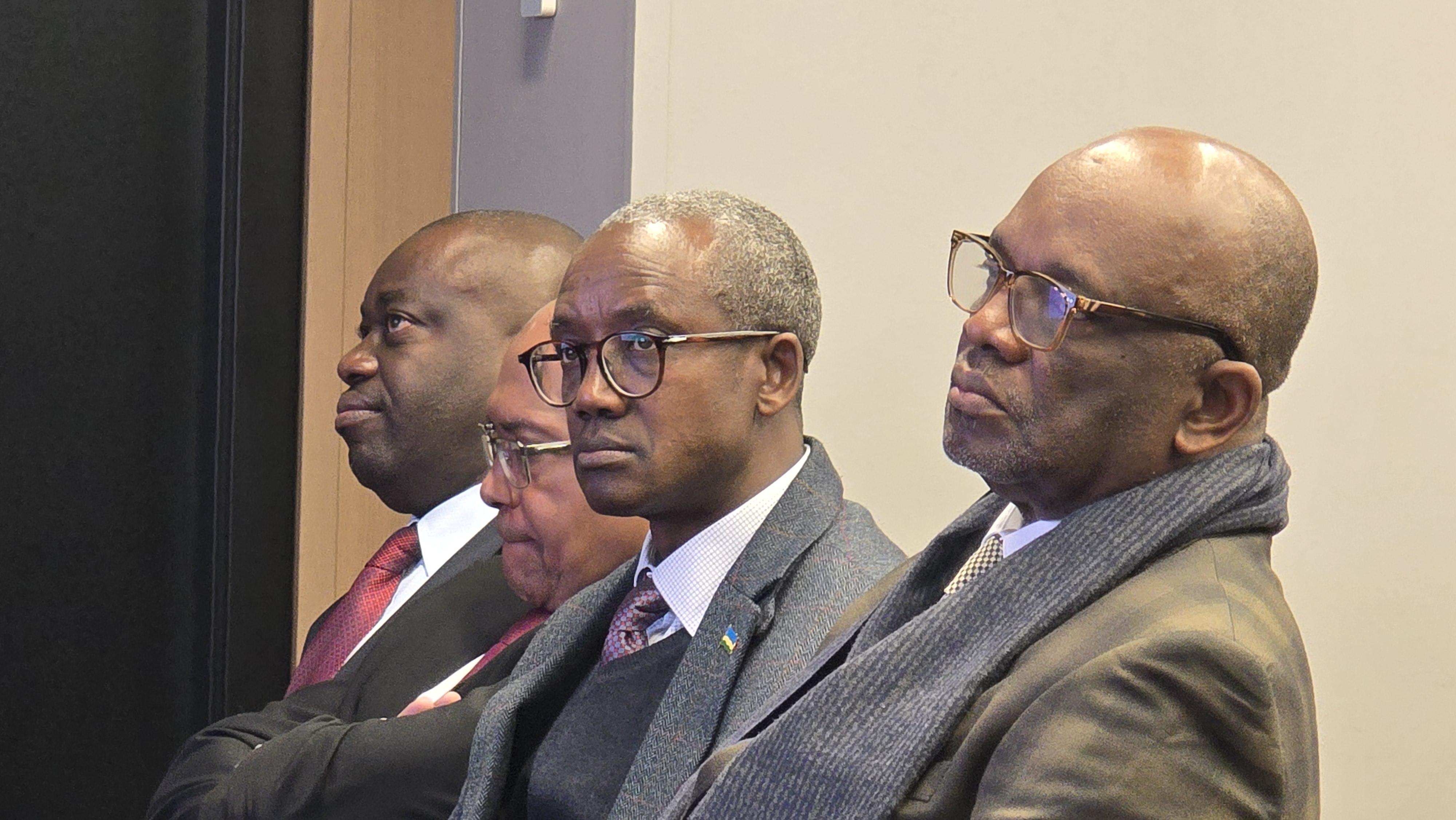
INTERNATIONAL EXPERT SEMINAR ON “RUSSIA-AFRICA: ANALYZING PROSPECTS FOR STRATEGIC COOPERATION & IDENTIFYING OBSTACLES. FROM URANIUM TO HIGH TECHNOLOGIES” WAS HELD IN MOSCOW. IT WAS ORGANIZED BY PIR CENTER IN COOPERATION WITH THE TRIALOGUE CLUB INTERNATIONAL
December 9, 2025On November 14, 2025, international expert seminar was held in Moscow on the topic “Russia-Africa: Analyzing Prospects for Strategic Cooperation & Identifying Obstacles. From uranium to high technologies.” It was organized and conducted by PIR Center in cooperation with the Trialogue Club International (as part of the 128th Winter Session of the Club).
The event was attended by ambassadors, senior diplomats, business representatives, experts and young professionals from 25 countries, namely Russia, Chad, the Democratic Republic of the Congo, Gabon, Ghana, Egypt, Eritrea, Kenya, Rwanda, Niger, Namibia, Brazil, Australia, Finland, France, Israel, Germany, South Korea, Spain, Singapore, Sweden, Switzerland, New Zealand, Japan, the USA, the delegation of the International Committee of the Red Cross in Moscow, among others.
Dr. Vladimir Orlov, Director of PIR Center & President of the Trialogue Club International in his opening remarks described PIR Center's ongoing projects on Africa: “Uranium Markets of Sahel: Competition, Strategies, Further Developments”; and “Prospects for Cooperation between Russia and Africa on Global Security and High Technologies”, which PIR Center has been working on since 2022. Dr. Orlov also provided plans for their development in 2026-2027 for the audience. He acquainted the participants with the publications of PIR Center on this issue, in particular: "Prospects for Russia’s Cooperation with African and Persian Gulf States in the Peaceful Use of Atomic Energy"; "From the Gulf to Sub-Saharan Africa: The Development of Digital Technologies and Russia’s Interests"; "Technological Renaissance in Sub-Saharan Africa: Challenges and Opportunities for Russia".
“At PIR Center we have long been engaged with African issues. Our research and reports have received high praise both in Russia and across the African continent. Now, let's delve deeper, as they say. We are in-depth interested in the strategic cooperation between Russia and African states, whether it's nuclear energy, digital technologies, or other fields. We are ready to contribute to a better understanding of these issues”, Director of PIR Center underlined.
Mr. Vsevolod Sviridov, Deputy Director of the Faculty of World Economy and International Affairs / Centre for African Studies of HSE University, and Ms. Alexandra Zubenko, Consultant of PIR Center, delivered their keynote speeches.
“The growing importance of Russian supplies for the sovereignty and economic sustainability of African countries is undeniable: Russia now provides more than 20% of Africa’s fertilizer market, plays a major role in wheat and oil product deliveries, and exports over 50% value-added goods – a structure that fundamentally distinguishes Russia-Africa trade from Russia’s trade with Europe or even China”, Vsevolod Sviridov noted in his speech. His presentation is posted here.
“The Sahel remains one of the most resource-rich but least explored regions in the world, where political instability and security threats have long overshadowed commercial opportunities. However, Russia occupies a unique position that allows it to work effectively in these conditions due to political ties, an expanding institutional presence and a pragmatic approach to regional dynamics. All this gives Moscow the opportunity not only to enter the uranium market, but also to form a new model of cooperation in line with the aspirations of the Sahel states”, Alexandra Zubenko, Consultant of PIR Center, said in her speech. She presented to the audience the key conclusions from the new 200-page report (in Russian) of PIR Center “Uranium Competition in the Sahel Region and Russia’s Interests. Current Situation. Assessment of Prospects. Recommendations”. Her presentation is posted here.
Following the keynote remarks, a traditional Q&A session ensued. The session was moderated by the Club Co-Chair Dr. Elena Chernenko, Member of PIR Center Executive Board, Special Correspondent of the Kommersant Daily.
H. E. Mr. Joseph Nzabamwita, Ambassador Extraordinary and Plenipotentiary of the Republic of Rwanda, contributed to the discussion, “First of all, Africa seeks to develop and seeks to build relations with partners across the world. Africans are yearning for a brighter future, for a developed continent. We can have friends and partners from all over the world, including Russia.
Firstly, it shows the wonderful relationship and the partnership that is emerging between Russia and Africa, building on what the Soviet Union contributed to the liberation of Africa. But with all the research, let me tell you that we as Africans, I think the main work is on our side. Therefore, this comment is to complement what you have said and to tell you that we need to put our own houses in order.
Secondly, with all the elements you have highlighted, there is one important aspect missing. You can have the resources, you can have everything, but unless you invest in leadership and governance, your resources will be exploited, for example, by France in some of our French-speaking countries. Let me tell you that in some of our countries there is actually a neo-colonial law which states that our sovereign countries have sovereign rights over what is above the soil, but what is below the soil belongs to our former colonial masters. Just imagine – in 2025 we still have such a law. So yes, we are fighting neo-colonial policies and colonial policies, but we cannot blame everything on the colonialists. We cannot blame Europe or America.
Neither should we expect miracles, that simply because Russia is coming back to Africa, Russia will bring miracles and Africa will suddenly develop. The issue goes back to leadership and governance in our respective countries.”
H. E. Dr. Koma Steem Jehu-Appiah, Ambassador Extraordinary and Plenipotentiary of the Republic of Ghana, also shared his opinion on the main topic, “I believe that this discussion has come at the right time. And as an ambassador for my country, I want to say that this is important, because we need help to build our future. We should not reduce the talks about cooperation only to the issue of employment of the local population. We are talking about much more than that – about comprehensive development that will allow us to move forward.”
Mr. Joseph Kindundu Mukombo, Counselor of the Embassy of the Democratic Republic of the Congo, provided his comments on the topic of the meeting, “The partnership between Russia and Africa should be viewed not as an attempt to replace someone else's presence, but as a niche strategy and a form of influence. Russia cannot – and probably does not seek – to compete with China economically. Its strengths are a flexible approach to security issues, high–tech solutions in selected sectors such as nuclear and cybersecurity, as well as a political discourse consistent with the desire of many African elites to strengthen sovereignty.”
“I appreciate discussions. We discussed Sahel uranium and Africa-Russia relationship. The two topics give us more information and ideas”, H.E. Mr. Sosthene Ndemby, Ambassador Extraordinary and Plenipotentiary of the Gabonese Republic, shared his impressions of the seminar.
“The session was quite a good one and I appreciate that you invited me. Keep up good work”, Mrs. Esther Mwoombola, Counsellor of the Embassy of the Republic of Namibia, emphasized.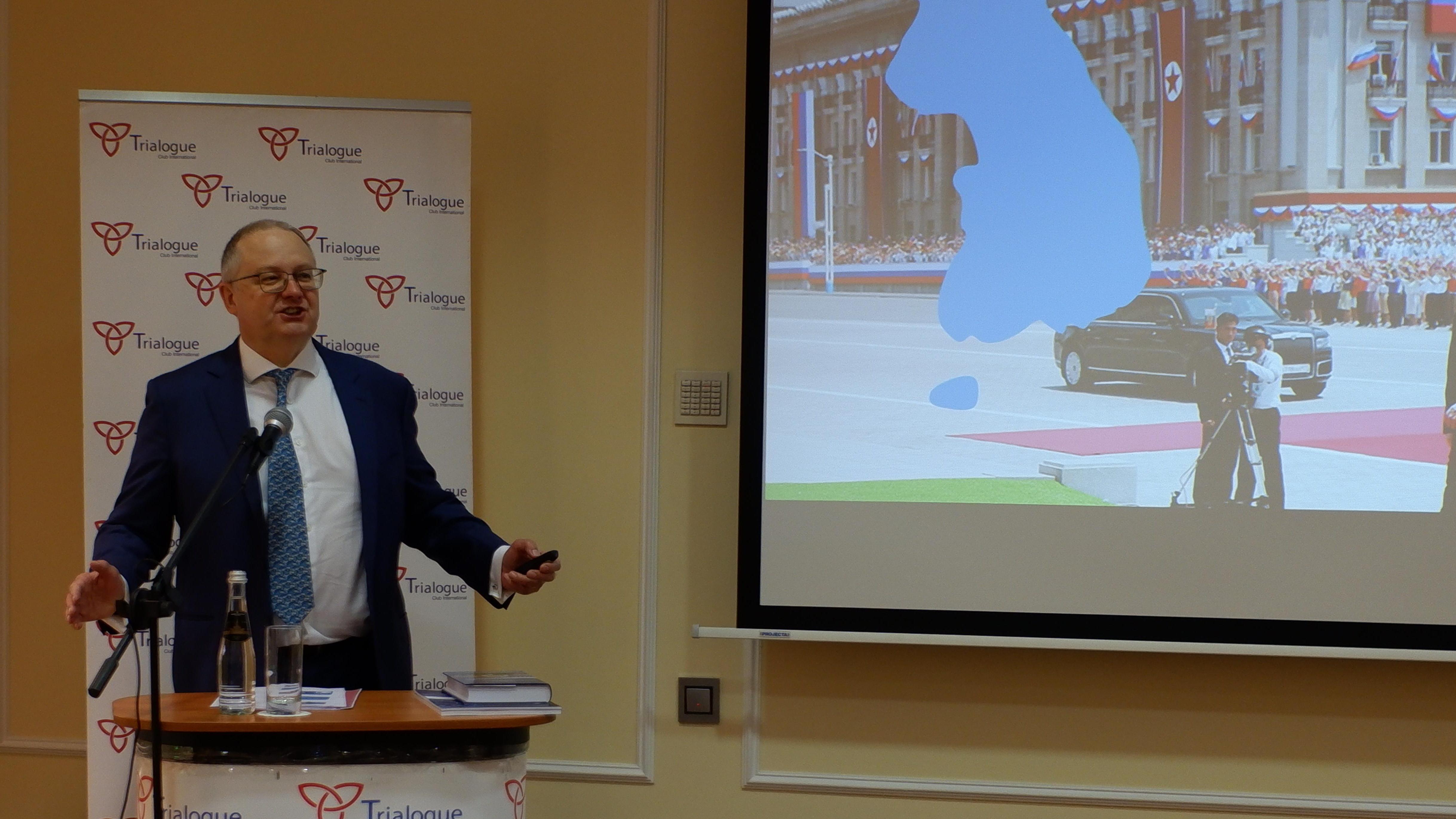 ON NOVEMBER 14, 2025, THE 128TH WINTER SESSION OF THE TRIALOGUE CLUB INTERNATIONAL WILL BE HELD IN MOSCOWOctober 29, 2025
ON NOVEMBER 14, 2025, THE 128TH WINTER SESSION OF THE TRIALOGUE CLUB INTERNATIONAL WILL BE HELD IN MOSCOWOctober 29, 2025On November 14, 2025, the 128th Winter Session of the Trialogue Club International will be held in Moscow. Current session of the Club will be devoted to the topic "Russia-Africa: Analyzing Prospects for Strategic Cooperation & Identifying Obstacles. From Uranium to High Technologies".
Mr. Vsevolod Sviridov, Deputy Director, Faculty of World Economy and International Affairs / Centre for African Studies, HSE University, and Ms. Alexandra Zubenko, Consultant, PIR Center, will deliver their keynote speeches.
The discussion will be moderated by the Club Co-Chair Dr. Elena Chernenko (Mrs.), Member of PIR Center Executive Board, Special Correspondent of the Kommersant Daily.
Event participation: strictly by invitation and only for Club members and special guests of the Club President. THE 127TH AUTUMN SESSION OF THE TRIALOGUE CLUB INTERNATIONAL WAS HELD IN MOSCOWOctober 29, 2025
THE 127TH AUTUMN SESSION OF THE TRIALOGUE CLUB INTERNATIONAL WAS HELD IN MOSCOWOctober 29, 2025The crucial issues of the international nuclear nonproliferation regime status ahead of the April-May 2026 NPT Review Conference were discussed. A "check-up" of each of the three NPT pillars was carried out.
The participants addressed various questions, including: What is the role of nuclear and non-nuclear States Parties to the Treaty? What are Russia’s interests in relation to the upcoming Review Conference? Where should we expect the main “bumps” along the way? Is it possible to expect a final consensus document – and if so, what would be its optimal and realistic parameters?
Distinguished experts: Dr. Vladimir Orlov, Founder & President, Trialogue Club International, Founder & Director, PIR Center; Mr. Igor Vishnevetskiy, PIR Center Advisory Board Member, Lecturer at the International Security Program, MGIMO University & PIR Center; Dr. Elena Chernenko (Mrs.), Member of PIR Center Executive Board, Special Correspondent of the Kommersant Daily, Co-Chair of the Trialogue Club International; Mr. Dmitry Stefanovich, PIR Center Advisory Board Member, Research Fellow of the Sector of Military Economy and Innovations of the Center for International Security, IMEMO RAS, enriched the discussion with their insightful and comprehensive contributions. The discussion was perfectly moderated by the Club Co-Chair Gen-Leut. (ret.) Evgeny Buzhinskiy, Chairman of PIR Center Executive Board. There were also interesting questions from the audience, including colleagues from Brazil, Croatia, Germany, Japan, and other countries.
Dr. Elena Chernenko emphasized: "The Treaty on the Non-Proliferation of Nuclear Weapons (NPT) faces numerous challenges, and the upcoming Review Conference does not promise to be easy. But even if the participants fail to agree on a final document, in my opinion, this should not be considered a failure, as this has already happened more than once, and the nonproliferation regime continues to hold. It would be a failure if one of the NPT member states were to announce its withdrawal from the Treaty. Unfortunately, this cannot be ruled out: if Israel and the United States decide to attack Iran’s nuclear infrastructure again, Tehran may well take such a step. However, to ensure that the conference is held in a more constructive spirit, it would be beneficial to create some positive impulses beforehand. One of these could be an agreement between Russia and the United States to maintain central quantitative restrictions for a year within the framework of the New START Treaty, which expires in February 2026".
To allow for inclusive and frank exchanges, the discussion was conducted under Chatham House Rule.
For further information about Trialogue Club International, fees, terms, and conditions of membership, please contact the Club Executive Secretary Ms. Eseniia Kosulina at secretary@trialogue-club.ru. ON OCTOBER 28, 2025, THE 127TH AUTUMN SESSION OF THE TRIALOGUE CLUB INTERNATIONAL WILL BE HELD IN MOSCOWOctober 21, 2025
ON OCTOBER 28, 2025, THE 127TH AUTUMN SESSION OF THE TRIALOGUE CLUB INTERNATIONAL WILL BE HELD IN MOSCOWOctober 21, 2025On October 28, 2025, the 127th Autumn Session of the Trialogue Club International will be held in Moscow. Current session of the Club will be devoted to the topic of the upcoming NPT Review Conference.
Session of the Club will be held in the format of a panel discussion, with distinguished experts who previously have taken part in closed discussions on nuclear nonproliferation. Among the panelists are: Dr. Vladimir Orlov, Founder & President, Trialogue Club International, Founder & Director, PIR Center; Mr. Igor Vishnevetskiy, PIR Center Advisory Board Member, Lecturer at the International Security Program, MGIMO University & PIR Center; Dr. Elena Chernenko (Mrs.), Member of PIR Center Executive Board, Special Correspondent of the Kommersant Daily, Co-Chair of the Trialogue Club International; Mr. Dmitry Stefanovich, PIR Center Advisory Board Member, Research Fellow of the Sector of Military Economy and Innovations of the Center for International Security, IMEMO RAS, PIR. The discussion will be moderated by the Club Co-Chair Gen-Leut. (ret.) Evgeny Buzhinskiy, Chairman of PIR Center Executive Board.
Event participation: strictly by invitation and only for Club members and special guests of the Club President.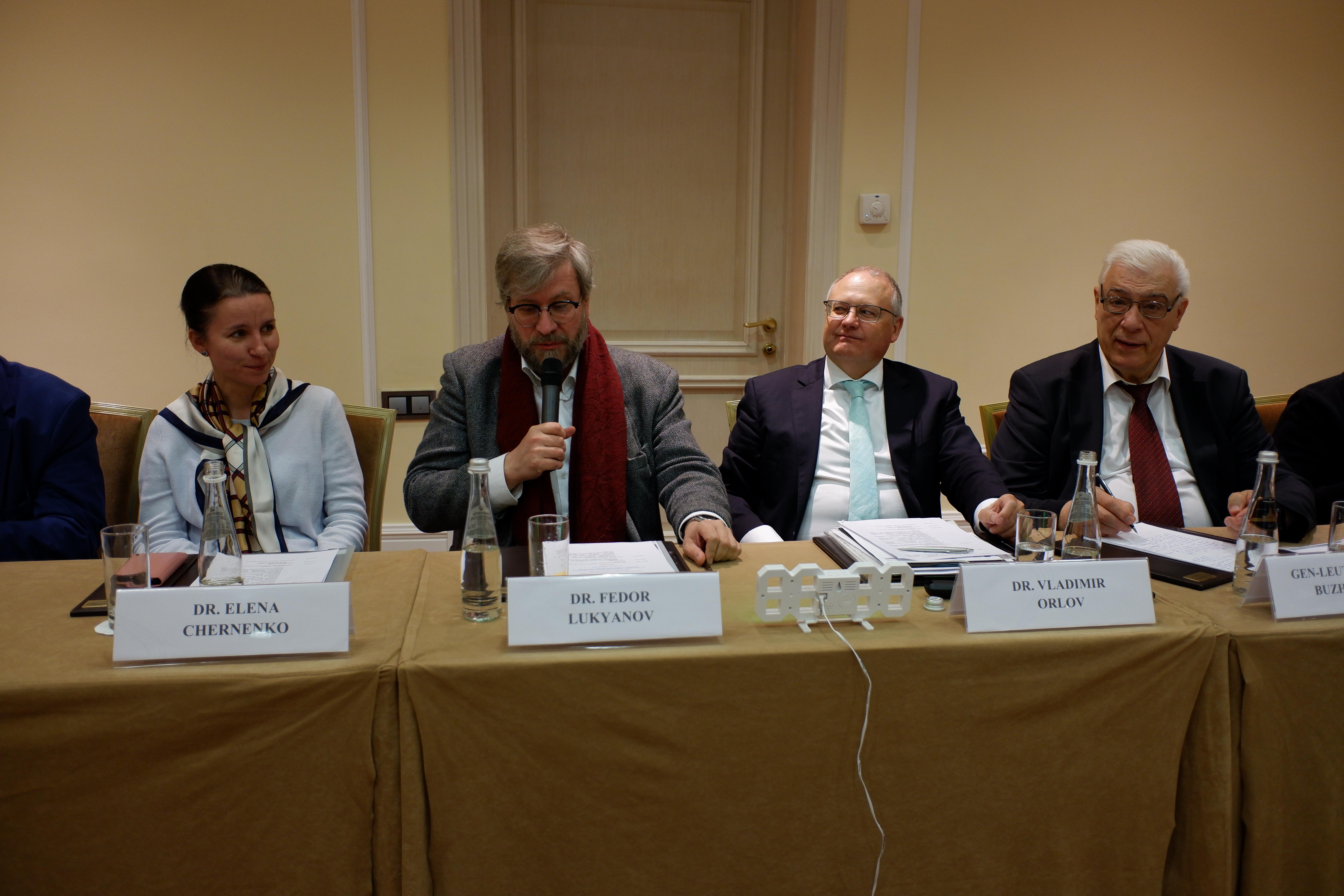 THE SUMMER SESSION OF THE TRIALOGUE CLUB INTERNATIONAL ON "RUSSIAN-AMERICAN RELATIONS: WHAT IS THE FUTURE?" WAS HELD IN MOSCOWJuly 10, 2025
THE SUMMER SESSION OF THE TRIALOGUE CLUB INTERNATIONAL ON "RUSSIAN-AMERICAN RELATIONS: WHAT IS THE FUTURE?" WAS HELD IN MOSCOWJuly 10, 2025On June 30, 2025, the 126th Summer Session of the Trialogue Club International entitled "Russian-American Relations: What is the Future?" was held in Moscow.
Dr. Vladimir Orlov, Founding Director of PIR Center, Founding President of the Trialogue Club International, delivered opening remarks and presented an overview of the PIR Center's educational and research activities and plans of the Club.
The discussion on the main topic of the session was structured in the roundtable format, to allow a better exchanges of views and opinions.
Dr. Fedor Lukyanov, Editor-in-Chief of the Russia in Global Affairs journal, Research Director of the Valdai Discussion Club, Chairman of the Council on Foreign and Defense Policy, Research Professor at the Faculty of World Economy and International Affairs of HSE University, PIR Center Advisory Board Member, delivered the keynote speech.
Mr. Thomas Graham, Honorary Fellow at the Council on Foreign Relations in New York City (online), special guest of the President of the Club, contributed to the dialogue and shared his expertise.
Dr. Elena Chernenko, Special Correspondent of the Kommersant Daily, Member of PIR Center Executive Board, Co-Chair of the Trialogue Club International and Gen-Leut. (ret.) Evgeny Buzhinskiy, Co-Chair of the Trialogue Club International; Chairman of PIR Center Executive Board; Dr. Ivan Safranchuk, Leading Researcher of the Institute for International Studies, MGIMO University, Member of PIR Center Advisory Board; Ms. Alexandra Zubenko, Consultant of PIR Center, MA graduate of the International Dual Degree Program “Global Security, Nuclear Policy, and WMD Nonproliferation” (developed by MGIMO University, PIR Center, and the Middlebury Institute of International Studies at Monterey, USA) (online).
Following the keynote remarks, a traditional Q&A session ensued. The session was moderated by the Club Co-Chair Dr. Elena Chernenko. As always, the meeting of the Trialogue Club International was under Chatham House rules.
The session was attended by members of the Trialogue Club International, in particular, ambassadors, embassy representatives, businessmen and experts from Germany, Finland, France, Mozambique, South Korea, Spain, Singapore, Slovenia, Sweden, Switzerland, New Zealand, Japan, the USA, the Delegation of the European Union to the Russian Federation, the International Committee of the Red Cross Delegation in Moscow, and special guests of the President of the Club from Iran, Sierra-Leone, Thailand and others.
Following the official part of the event, the Club members and special guests of the President of the Club were invited to informal communications over cocktails.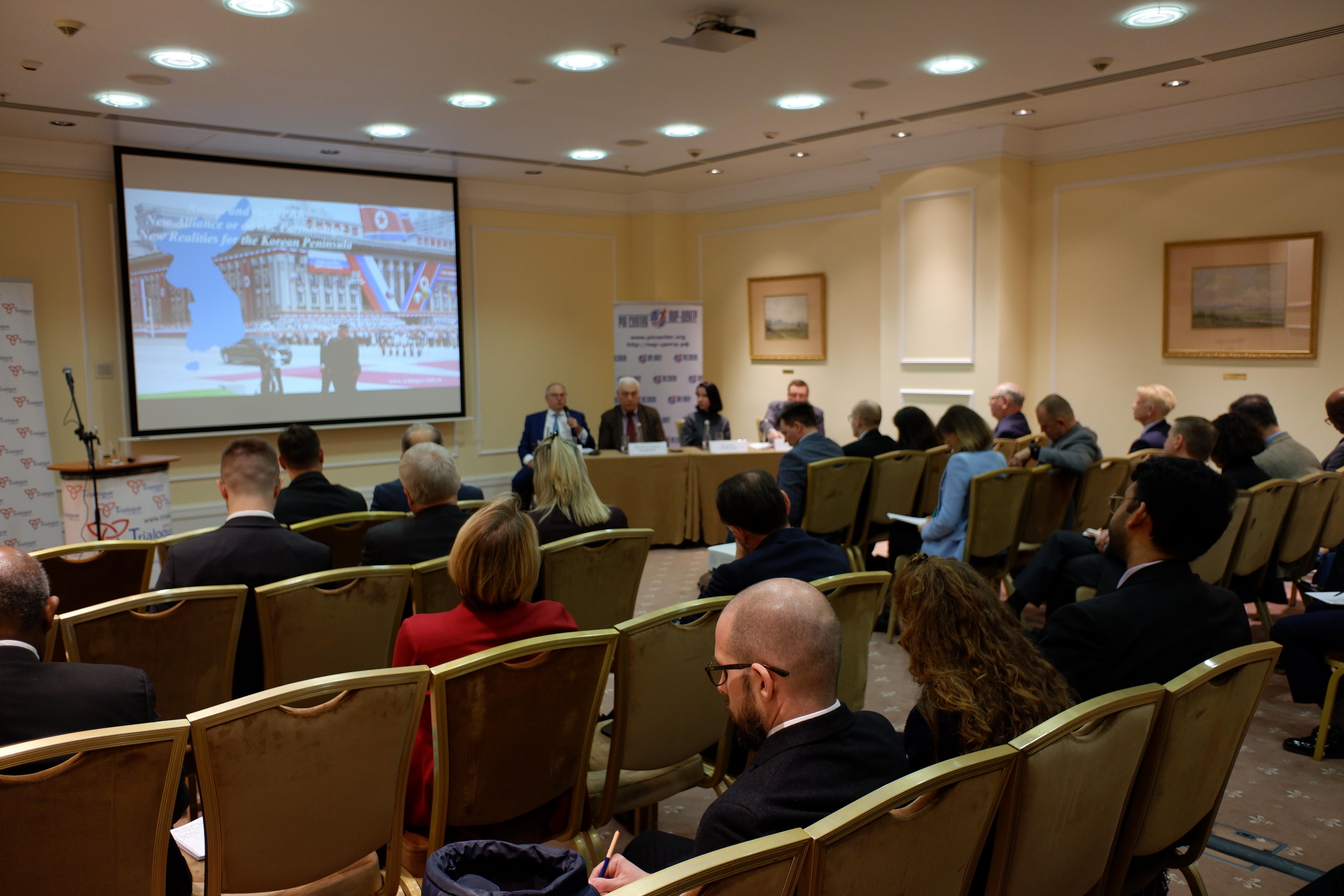 ON JUNE 30, 2025, THE 126TH SUMMER SESSION OF THE TRIALOGUE CLUB INTERNATIONAL WILL BE HELD IN MOSCOWJune 21, 2025
ON JUNE 30, 2025, THE 126TH SUMMER SESSION OF THE TRIALOGUE CLUB INTERNATIONAL WILL BE HELD IN MOSCOWJune 21, 2025On June 30, 2025, the 126th Summer Session of the Trialogue Club International will be held in Moscow. Current session of the Club will be devoted to the topic of the U.S.-Russia relations.
“Session of the Club will be held in the format of a round table during which both invited experts and members of the Trialogue Club International will take the floor. Dr. Fedor Lukyanov will address the opening remarks. Then, the Q & A Session will be ensued during the Club Session. The discussion will be led by the Club Co-Chairs: Dr. Elena Chernenko and Leut.-Gen. (ret.) Evgeny Buzhinskiy, as well they will give their comments. As the Club President, I will give my assessment during the Session. According to the significance of the topic, we will add an extra hour to the discussion this time. Event participation: strictly by invitation and only for Club members and special guests of the Club President,” Dr. Vladimir Orlov, President of the Trialogue Club International, Founding Director of PIR Center, reported in his telegram-channel “Sobesednik-na-Piru”.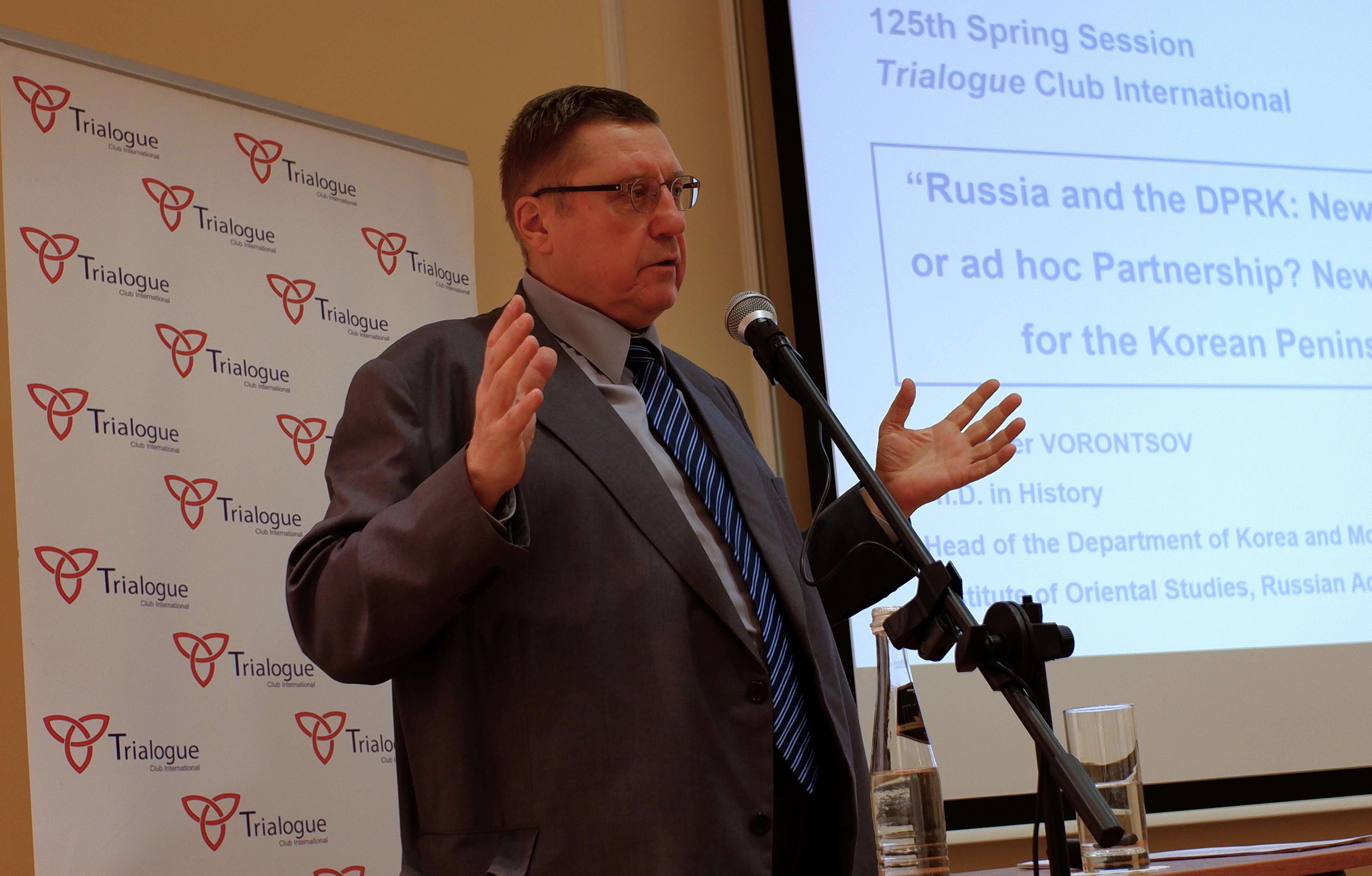
"Russia always emphasizes that our co-operation with the Democratic People’s Republic of Korea is consistent with the norms of international law and is not directed against the security of the Republic of Korea”: from the keynote speech by Dr. Alexander Vorontsov at the 125th Spring Session of the Trialogue Club International
May 5, 2025The dynamics of the development of bilateral relations between the Russian Federation and the DPRK after the signing of the Comprehensive Strategic Partnership Treaty on 19 June, 2024 leads analysts to conclude that cooperation between Moscow and Pyongyang has now reached an unprecedented high level, perhaps even surpassing the corresponding parameters of the Soviet Union period. This phenomenon is based primarily on two factors: Pyongyang’s uncompromising support for Russia’s special military operation (SMO) in Ukraine and the unique trusting personal relationship that has developed between the leaders of our two countries.
There is plenty of evidence for this statement. There is a regular exchange of visits between representatives at a high political level, who perform, among other things, the functions of special envoys of heads of State. During the past month Lee Hee Yong, a member of the Political Bureau of the Central Committee of the WPK, visited Moscow, and Sergei Shoigu, Secretary of the Security Council of the Russian Federation, visited Pyongyang. Both of them were accepted by the heads of state.
The 10th and 11th Meetings of the intergovernmental commission of the Russian Federation and the DPRK on trade, economic, scientific and technical cooperation, held in Pyongyang in November 2023 and 2024. The events were unprecedented in terms of the number and composition of participants: the Russian delegation exceeded 100 people, in each case included ministers and deputy ministers. Over the past two years, the heads of almost all leading Russian agencies have visited the DPRK. Inter-party relations are actively developing: Dmitry Medvedev, Chairman of the United Russia Party, met with Lee Hee Yong, Secretary of the Central Committee of the WPK, on 26. 02. 2025, and inter-parliamentary relations have become systemic.
Although cooperation in the economic sphere is burdened by international sanctions, there are areas that are not affected by them, where there is a high dynamics of interaction. The signed Agreements on cooperation in the field of healthcare and the development of road transport are being vigorously implemented. So in the near future, a ceremony is being prepared to begin the construction of an automobile bridge over the Tumangan border river. Cooperation is actively developing in the educational, cultural, sports, tourism, and humanitarian fields in general. More and more Russian students are showing interest in learning the North Korean version of the Korean language. The fact that several hundred Russian servicemen who were injured in the course of their military operations were accepted free of charge to undergo rehabilitation courses in medical institutions in North Korea was highly appreciated in Russian society. A high-level delegation from the DPRK is expected to arrive in Moscow on May 9 to celebrate the 80th anniversary of Victory in the Great Patriotic War.
The Russian and international expert community is increasingly voicing the following assessments: after signing the said Comprehensive Strategic Partnership Treaty with Russia, the DPRK now finds itself in a uniquely favorable position; it has become the only state in the world that has alliance treaties with two superpowers. The reality is that most of the tasks of the 8th Congress of the TPC 2021 have been accomplished. Among other things, the “10 x 20” project for the development of the periphery is now being successfully implemented, where not only local industry and grain storage facilities, but also modern hospitals are being built in the district centers. There is reason to believe that this is facilitated by cooperation with Russia, including in the medical sphere.
Based on these facts, there are even bold judgments that the DPRK’s star is now rising on the Korean Peninsula, which is successfully emerging from the economic crisis and geopolitical isolation, while South Korea has entered a period of serious crisis turbulence.
In military and political terms, the Korean Peninsula is teetering on the brink of conflict, the likelihood of which has increased during the administrations of J. Biden in the United States and Yoon Suk Yeol in the ROK. The strategic goals of the governments of both of the above-mentioned countries have been de facto aimed at the liquidation of the DPRK. Among other things, the strategy of Korean unification announced by Yoon Suk Yeol openly denies the DPRK the right to exist, which is an amazing example of non-recognition of the realities in the form of the existence of two Korean states, members of the UN.
In this context, both Pyongyang’s choice in recent years to strengthen its national defense capabilities, including its nuclear missile component, and Moscow’s conclusion that under the current circumstances the ideas and attempts to restore the negotiation processes based on the principles of denuclearization of the DPRK have lost their relevance and realism become more understandable.
As is well-known, the fundamental permanent basis of Russia’s policy towards the Korean Peninsula is the approach, the essence of which is as follows. Korea is Russia’s neighbor, and each of the Korean states represents its own special, unique, but extremely important value for Moscow. Therefore, the course aimed at careful attitude and cultivation of good-neighborly, friendly relations with both Korean states corresponds to the fundamental national interests of Russia.
These strategic attitudes remain vital today. At the same time, naturally, the events of world politics in recent years, which arose in connection with the military conflict in Ukraine, predetermined a serious transformation of both Russian-North Korean and Russian-South Korean relations.
Russia was forced to launch a Special military operation (SMO) in Ukraine on February 24, 2022. in response to the long-term expansion of the NATO bloc to the East, which ignored numerous appeals, proposals and warnings from Moscow, brought its military infrastructure close to Russia’s borders, began to actively develop the territory of Ukraine militarily and decided to use the Kiev regime as the main tool for inflicting a “strategic defeat” on Russia.
The DPRK and the Republic of Korea reacted to this epoch-making event in diametrically opposite ways. Pyongyang fully shared and supported the Russian assessments of the causes of the conflict, as well as the motives for actions conditioned by the protection of national sovereignty and security. Seoul, bound by allied obligations with the United States, supported Washington’s position, seeking to present Russia’s actions as allegedly “unprovoked aggression” in order to “restore the Russian empire,” etc., and joined the anti-Russian sanctions of the West.
Naturally, these new realities have profoundly affected Moscow’s policy towards both Pyongyang and Seoul.
Russian-North Korean relations
From the very beginning of its operation to this day, the DPRK has taken a position of resolute, firm support for Russia’s actions both at the level of political and international rhetoric and at the level of practical actions. A fundamentally important action of the DPRK was the vote in solidarity with Moscow on the anti-Russian resolution at the UN General Assembly, adopted on March 2, 2022, February 23, 2023 and further on Ukraine. Pyongyang has voted against this resolution every time.
The DPRK media periodically and in detail, from an objective position of full solidarity with Russia, truthfully covered the course of its war, the reasons for its beginning, including the factors that forced Moscow to make such a difficult decision, etc. In this context, it is advisable to highlight a detailed article by the well-known political scientist Kim Myung-chol, dedicated to the anniversary of the beginning of the SMO and a detailed analysis of the events that occurred during this period. The Korean expert focused readers’ attention, among other things, on the following theses: “The policy of “eastward expansion” of NATO, which is pursued by the United States and the West, is aimed at accelerating the encirclement of Russia, the successor of the USSR, by an enemy ring and, ultimately, at splitting and weakening Russia, at its eternal destruction – this is already a clear fact. … The policy of hegemony of the United States and the West … forced Russia to take preventive military action to eliminate the military threat to its country from the outside.”
One of the culminating manifestations of categorical support and solidarity with Russia was the statement of Kim Yo Jong, Kim Jong Un’s sister, on January 27, 2023, filled with powerful energy and imagery, in which it was emphasized that “we are in the same trench” with Russia.
In this statement, it was emphasized: “I express serious concern and strongly condemn the actions of the United States, which are escalating the military situation by transferring military offensive equipment to Ukraine, including its main tank. … I have no doubt that any military equipment that the United States and the West are proud of will burn down and become a pile of iron in front of the indestructible fighting spirit and power of the heroic Russian army and people. No matter how desperate the allied imperialist forces may be, they will never break the heroic spirit of the Russian army and people with high patriotism, fortitude and strong spirit. We will always stand in the same trench on the battlefield with the Russian army and people who are fighting for the dignity and honor of the country, its sovereignty and security.”
The DPRK has taken not only statements, but also practical steps to support Russia. In July 2022, the DPRK established official diplomatic relations with the Donetsk and Lugansk People’s Republics. Thus, the DPRK became the fifth country to recognize the DPR and the LPR after South Ossetia, the Russian Federation, Abkhazia and Syria. At the same time, Kiev, as expected, broke off diplomatic relations with the DPRK in response.
Moreover, the DPRK’s political organizations have resolutely engaged in a fierce polemic with representatives of the West, including the EU, on this issue. Pyongyang noted “due to the fact that our country recognized the independence of the DPR and the LPR, on July 20, the EU representative found fault with us, ranting that this was a “violation of international rights” and “a hostile act against sovereignty and territorial integrity. …The EU should not pry into its own business, condemning the use of sovereignty by other countries, but should first of all learn how to treat all issues fairly in accordance with the UN Charter, the principle of which is respect for sovereignty, sovereign equality and non-interference in internal affairs, and international law.” [4]
Then another important event took place both on the way to further strengthen friendly relations between the Russian Federation and the DPRK, and in the process of consistent implementation of the North Korean line to support its own. On October 4, 2022, Pyongyang officially supported the results of referendums in the DPR, LPR, Zaporizhia and Kherson regions on joining Russia and recognized the legality of their very fact of becoming part of the Russian Federation.
Explaining this decision of his government, the head of the Department of International Organizations of the DPRK Foreign Ministry, Cho Chol Su, stressed: “We respect the will of the residents who wanted to reunite with Russia, and support the position of the Russian government on making these regions part of the country.” He also highlighted the fact that “Referendums were held in accordance with the UN Charter, which enshrines the principles of equal rights of people and their right to self-determination, in accordance with legitimate procedures that allowed reflecting the will of the inhabitants of two republics and two regions,” and the overwhelming majority of voting participants supported joining Russia.
By taking such a bold step, the DPRK became the first state in the world to recognize the legitimacy of both plebiscites in the four above-mentioned subjects and the legislative registration of their entry into the state structure of the Russian Federation.
Moscow and Pyongyang’s common understanding of the specifics of today’s international relations, challenges and threats to their own national interests, first of all, the nature of the policy of the US administration of J. Biden, aimed ultimately at eliminating both Russia and the DPRK in their current form, logically and expectedly led the two states to a higher level of cooperation.
This was reflected in the signing of the bilateral Treaty on Comprehensive Strategic Partnership between Russia and DPRK on June 19, 2024, which created a legitimate legal basis for further expansion of cooperation in all areas, and quickly confirmed its effectiveness, the fact that it is not just a “piece of paper” and a really valid working document. The manifestations of a new phase of rapprochement between Moscow and Pyongyang after the signing of this treaty are numerous.
This is also Moscow’s more resolute support for Pyongyang’s actions to ensure its own security on the Korean peninsula, expressed in clear unambiguous formulations by the leadership of the Russian Foreign Ministry. In this regard, it is enough to mention the relevant statements of Foreign Minister Sergei Lavrov and his deputy Andrei Rudenko.
On September 26, 2024, Sergey Lavrov emphasized the following: “We fully take into account and rely on new realities in the current international situation in the field of global and regional security, including in the nuclear dimension. We understand the principled position of our Korean friends that the nuclear missile shield and other self-defense measures are the basis for ensuring our own independence and security. The United States, with the support of its allies, is aggressively dragging elements of the military-strategic infrastructure into the region and actively using systems related to nuclear weapons carriers there, practicing together with the Republic of Korea and Japan in increasingly provocative and destabilizing schemes of the so-called “expanded nuclear deterrence”. It has come to the point that the US-South Korean alliance is already openly called, by analogy with NATO, the “nuclear alliance”, which is clearly on the way to becoming a triple bloc with the participation of Japan, which has defiantly embarked on a course of remilitarization. This is a real and extremely serious threat to regional security. Under these conditions, even the term “denuclearization” in relation to the DPRK has lost all meaning. This issue is closed to us.
Characterizing the essence of the signed document, Andrey Rudenko highlighted the following: “The Comprehensive Strategic Partnership Treaty between Russia and the DPRK is designed to play a stabilizing role in Northeast Asia, will make a positive contribution to maintaining the balance of power in the region based on the principle of indivisibility of security, reducing the risk of a recurrence of war on the Korean peninsula, including with the use of nuclear weapons, and generally lays the foundation for the construction of a new Eurasian security system”, … “Article 4 of the document is of particular importance, providing for the provision of mutual military assistance in accordance with Article 51 of the UN Charter and in accordance with the laws of the Russian Federation and the DPRK in the event that one of the parties is subjected to an armed attack by any state, finding itself in a state of war,” he said. “Thus, the content of the mentioned article clearly indicates that the treaty is defensive in nature, is not directed against the security of third countries, and is aimed at maintaining stability in the Northeast Asia region.”
Based on the legal basis of the treaty, Pyongyang has also begun to provide more resolute and diverse assistance to Russia. In recent days, the media of the West and South Korea have been writing a lot about the fact that the DPRK sent not only ammunition to Russia, but also its soldiers.
In this regard, Russian President Vladimir Putin spoke clearly and frankly. In particular, “The Head of State noted that the provision of military assistance is discussed in the fourth article of the document. “There is a fourth article. What we will do with this article is still a question. We are in contact with our North Korean friends. And when something needs to be decided, we will certainly decide, our friends from the Democratic People’s Republic of Korea have a corresponding position,” Putin said. “But I want to say that this is our sovereign decision: we will apply something, we will not, where, how, whether we need it or whether we will be engaged, for example, only in conducting some exercises, preparing, transferring some experience – this is our business.”
This alliance agreement is inherently similar to those treaties that the United States has long concluded with many countries, including the Republic of Korea, and on the basis of which they permanently deploy their own troops and military bases in them. The Russian leadership has repeatedly explained the purpose and objectives of the said agreement with the DPRK.
Russian-South Korean relations
At the moment of the geopolitical fracture, Seoul, like all US allies, Seoul, as expected, immediately joined the course of the senior partner, including the anti-Russian sanctions regime. Russia has included the ROK in the list of “unfriendly states” as a response. At the same time, Moscow noted that South Korea does not seek to become at the forefront of Western sanctions policy, that the degree of its participation in anti-Russian actions is more moderate compared to many other US allies, and Russophobia does not spread in the country.
It seems to us that the goal of the Foreign Ministries of both countries is pragmatic tasks to preserve the maximum possible in the field of our mutually beneficial cooperation. As part of this goal, Moscow’s urgent task was to try to keep Seoul from directly supplying lethal weapons to Ukraine, to which Washington began to harshly urge all its allies. Until recently, such a line was more or less maintained by the leadership of the Republic of Korea, and in response to numerous requests from Ukraine for the supply of numerous types of weapons and pressure from Washington, the response to this request was sustained by South Korea in the spirit that the Republic of Korea, for humanitarian reasons, is ready to provide Ukraine with only non-combat weapons and means of protection, such as helmets and bulletproof vests, but supplies of combat, especially offensive weapons are excluded.
Naturally, there is an understanding in these calculations by Seoul that if South Korea were to be careless in terms of military cooperation with Ukraine, this would provide Russia not only with a reason, but also a direct basis for revising the current restrained approach to the issue of modern arms supplies to the DPRK.
As a result, Moscow even formed an informal definition that South Korea has now become the “friendliest among unfriendly” states for Russia.
However, the realities of allied relations with the United States and the logic of behavior within the framework of this model often force Seoul to take certain steps that it may be would prefer not to take. One of such important events was the first-ever trilateral summit of the United States, Japan and South Korea held at Camp David on August 18, 2023, which resulted in a profound transformation of the trilateral association, which previously did not go beyond the amorphous term “coalition structure”, into an almost full-fledged military-political security pact. As a result, both Far Eastern allies of the White House made serious concessions to Washington, which could complicate their relations with Russia. This also applies to South Korea.
Moscow has repeatedly demonstrated restraint in its reaction to Seoul’s accession to anti-Russian sanctions, commitment to dialogue and maintaining positive bilateral relations with the Republic of Korea. This approach is still fully maintained today. At the same time, Moscow proceeds from the understanding that if we believe the statements of the South Korean partners that they do not supply lethal weapons to Ukraine, then they should also take our word for it that we comply with UN Security Council resolutions.
The events of recent weeks, the progress of cooperation between the Russian Federation and the DPRK, of course, have formulated new questions for Seoul. The future of Russian-South Korean relations largely depends on what response the leadership of the Republic of Korea chooses to new challenges.
In this regard, we consider it necessary to emphasize that today a fundamentally important integral feature and component of Russian policy towards the Korean peninsula and, specifically, the Republic of Korea is its non-confrontational nature, the desire to maintain in relations with Seoul that, although currently low, but an important level of interaction and cooperation, which is still maintained.
The strategic goal of this approach is to use the preserved segments of bilateral cooperation, primarily in the humanitarian field today, as a foundation for restoring a full-fledged volume of bilateral cooperation after the end of the conflict in Ukraine. It is precisely this important task that Vassily Nebenzia, Russia’s Permanent Representative to the United Nations, pointed out with all frankness in his speech to the UN Security Council on October 30, 2024.
At first, he gave a vivid description of the unfair actions of the West, led by the United States. “I want to ask one very simple question: even if we imagine that all that our Western colleagues claim about military cooperation between Russia and the DPRK would suddenly turn out to be true, why are the United States and its allies trying to impose rotten logic on the whole world that they have the right to help the Zelensky regime by mobilizing the entire the military and intelligence potential of NATO, and Russia’s allies do not have the right to do this? Where, ladies and gentlemen, do you get this neocolonial sense of your own exclusivity and impunity and an unfounded belief that what you can do is not allowed to others?”
But then Amb. Vasily Nebenzia directly addressed the representative of the Republic of Korea to the UN with the following words. “I think it’s no secret that the Western accomplices of the Zelensky regime have been trying for more than two years to persuade the leadership of the Republic of Korea to more active military-technical cooperation with the Kiev regime, to encourage it to supply it with highly demanded lethal weapons. Here, the anti-Pyongyang “hype” to Washington, London and Brussels is just very useful, because the Kiev regime has almost completely “sucked out” their own reserves.
We hope that our South Korean colleagues will have the wisdom not to fall for this trick. In any case, I can assure you that, despite the current difficult period, we strive to preserve the prerequisites for the resumption of traditionally good-neighborly relations between Moscow and Seoul and appreciate your restraint. Public opinion polls in your country are also optimistic, which show that the overwhelming majority of the population does not want the Republic of Korea to be involved in the Ukrainian conflict.”
In the framework of this topic, it is appropriate to note a number of assessments expressed in an interview on April 2 this year by the Russian Ambassador to the ROK G.V. Zinoviev: It is also important that the Republic of Korea refrained from supplying lethal weapons to Ukraine. Those Western countries that are actively pumping arms into Ukraine have spoiled relations with Russia for many years to come.
The Russian Ambassador emphasized the importance of the task of restoring direct bilateral dialogue. We are now communicating constructively enough with the Korean side both through our Embassy in Seoul and through my colleagues, the Embassy of the Republic of Korea in Moscow.
(As you know, the South Korean Ambassador to Moscow, Mr. Lee Do-hoon, may be the only one among representatives of “unfriendly states” who has not been restricted in his ability to meet both in the Russian Foreign Ministry and in other agencies officials, to travel around the country, and he has recently visited Tyumen city and Murmansk, among other places).
Unfortunately, other channels of communication, such as the work of the Intergovernmental Commission and the Interregional Cooperation Forum, which we used to hold earlier, as well as inter-parliamentary contacts now remain frozen. The restoration of a full-fledged dialog would contribute to solving the existing problems. In addition, I would like to see the direct air service between our countries resumed as soon as possible.
As for our relations with the DPRK. I know that our partners in the Republic of Korea and I have diametrically opposed views on this matter. Russia always emphasizes that our co-operation with the Democratic People’s Republic of Korea is consistent with the norms of international law and is not directed against the security of the Republic of Korea. Moreover, it contributes to strengthening peace and stability on the Korean peninsula and does not, as we believe, contradict the interests of the Republic of Korea. I would like to draw your attention to the fact that Pyongyang is showing great restraint against the background of both the well-known domestic political developments in the ROK and the recent large-scale Freedom Shield maneuvers with the United States. We urge you to change your perspective and see our engagement with the DPRK not as a crisis and threat, but as an opportunity.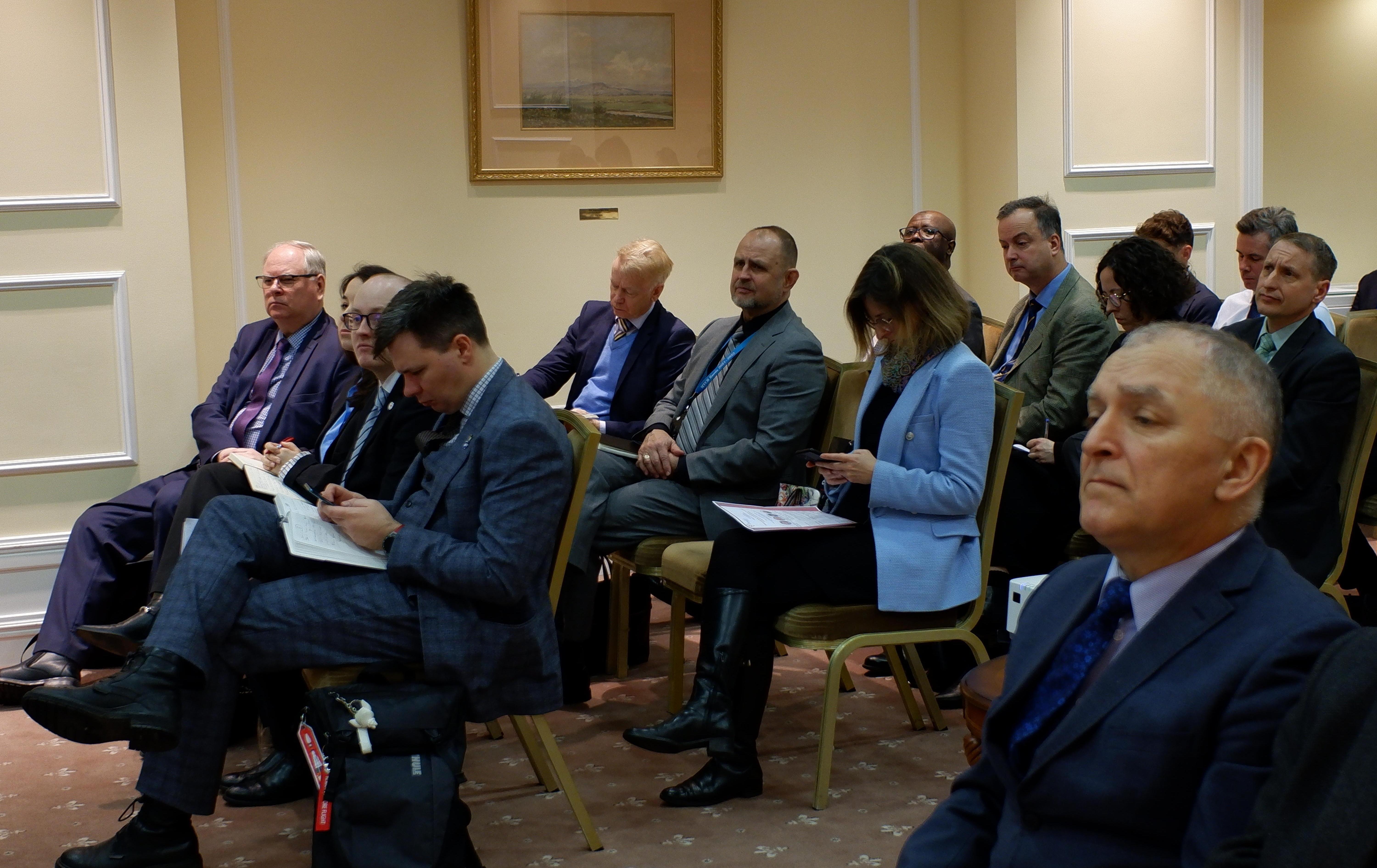 THE CURRENT SITUATION OF REGIONAL SECURITY ON THE KOREAN PENINSULA WAS DISCUSSED AT THE 125TH SPRING SESSION OF THE TRIALOGUE CLUB INTERNATIONALApril 7, 2025
THE CURRENT SITUATION OF REGIONAL SECURITY ON THE KOREAN PENINSULA WAS DISCUSSED AT THE 125TH SPRING SESSION OF THE TRIALOGUE CLUB INTERNATIONALApril 7, 2025On April 7, 2025, the 125th Spring Session of the Trialogue Club International on the topic “Russia and the DPRK: New Alliance or ad hoc Partnership? New Realities for the Korean Peninsula” took place in Moscow.
Dr. Vladimir Orlov, Founding President of the Trialogue Club International, Founding Director of PIR Center, Professor at MGIMO University, delivered opening remarks.
Dr. Alexander Vorontsov, Head of the Department of Korea and Mongolia, Institute of Oriental Studies, Russian Academy of Sciences; PIR Center Advisory Board Member, delivered the keynote speech.
Mr. Dmitry Stefanovich, Research Fellow of the Sector of Military Economy and Innovations of the Center for International Security, Primakov National Research Institute of World Economy and International Relations, Russian Academy of Sciences (IMEMO RAS); Member of PIR Center Advisory Board, provided expert remarks.
Following the keynote address, a traditional Q&A session ensued. The Session was moderated by the Club Co-Chairs: Dr. Elena Chernenko, Special Correspondent of the Kommersant Daily, Member of PIR Center Executive Board, and Gen-Leut. (ret.) Evgeny Buzhinskiy, Chairman of PIR Center Executive Board. As always, the meeting of the Trialogue Club International was held under Chatham House rules.
The session was attended by members of the Trialogue Club International. The attendees included representatives from the embassies of Mozambique, Spain, New Zealand, Norway, Singapore, Slovenia, Sweden, Switzerland, the USA to Russia, the Delegation of the European Union to the Russian Federation, the International Committee of the Red Cross Delegation in Moscow, etc., as well as special guests of the President of the Club from the region under discussion.
Following the official part of the event, the Club members and special guests of the President of the Club were invited to informal communications over cocktails. PIR CENTER PREPARED THE REPORT ON OPEN-SOURCE INTELLIGENCE (OSINT) IN INTERNATIONAL SECURITY AND NONPROLIFERATION RESEARCHFebruary 21, 2025
PIR CENTER PREPARED THE REPORT ON OPEN-SOURCE INTELLIGENCE (OSINT) IN INTERNATIONAL SECURITY AND NONPROLIFERATION RESEARCHFebruary 21, 2025«The idea for this Report emerged while preparing PIR Center’s analytical report New Nuclear Nine? Assessing Nuclear Proliferation Threats in the World. During its development, the PIR Center research team encountered limitations in the available source base for analyzing risks and threats to the nuclear nonproliferation regime. The primary sources of information included newspapers, specialized publications, politicians’ statements, and materials from official websites, which inevitably resulted in certain ‘blind spots,’» – Sergey Semenov, Research Fellow at PIR Center.
PIR Center has completed work on the Report Methodology and Practice of Open-Source Intelligence (OSINT) in Research on International Security, Arms Control, and the Nonproliferation of Weapons of Mass Destruction. The author of the Report is Sergey Semenov, Research Fellow at PIR Center.
The Report aims to support students enrolled in the Open-Source Intelligence course within the International Security Master’s program, a joint initiative of MGIMO University and PIR Center. The course will cover the fundamental principles and tools of open-source intelligence, explore the potential for automation in OSINT research, and present methods for assessing the completeness, reliability, and potential misinformation of collected data.
Modern information technologies enable the effective identification of current and emerging threats to the nuclear nonproliferation regime. Recent notable achievements include U.S. experts identifying potential deployment areas for Chinese ICBMs using satellite imagery, analyzing Iran’s missile program through satellite data, and assessing North Korean ICBM specifications based on military parade photographs.
A key advantage of integrating new technologies into open-source intelligence is their ability to leverage unconventional sources to supplement and verify traditional ones, such as the press, television, and official statements. OSINT involves working with vast amounts of potentially valuable data, including satellite images, photographs, videos, and social media content.
PIR Center actively employs open-source intelligence methods in its research projects. These methodological approaches were rigorously applied in the analytical report New Nuclear Nine? Assessing Nuclear Proliferation Threats in the World. An updated version of this study is scheduled for release by the end of 2025.
The Report was developed within the PIR Center’s “Reports Series” (№ 44) as part of the joint PIR Center & MGIMO University project “Global Security, Strategic Stability, and Arms Control” under the “Priority-2030” Strategic Academic Leadership Program.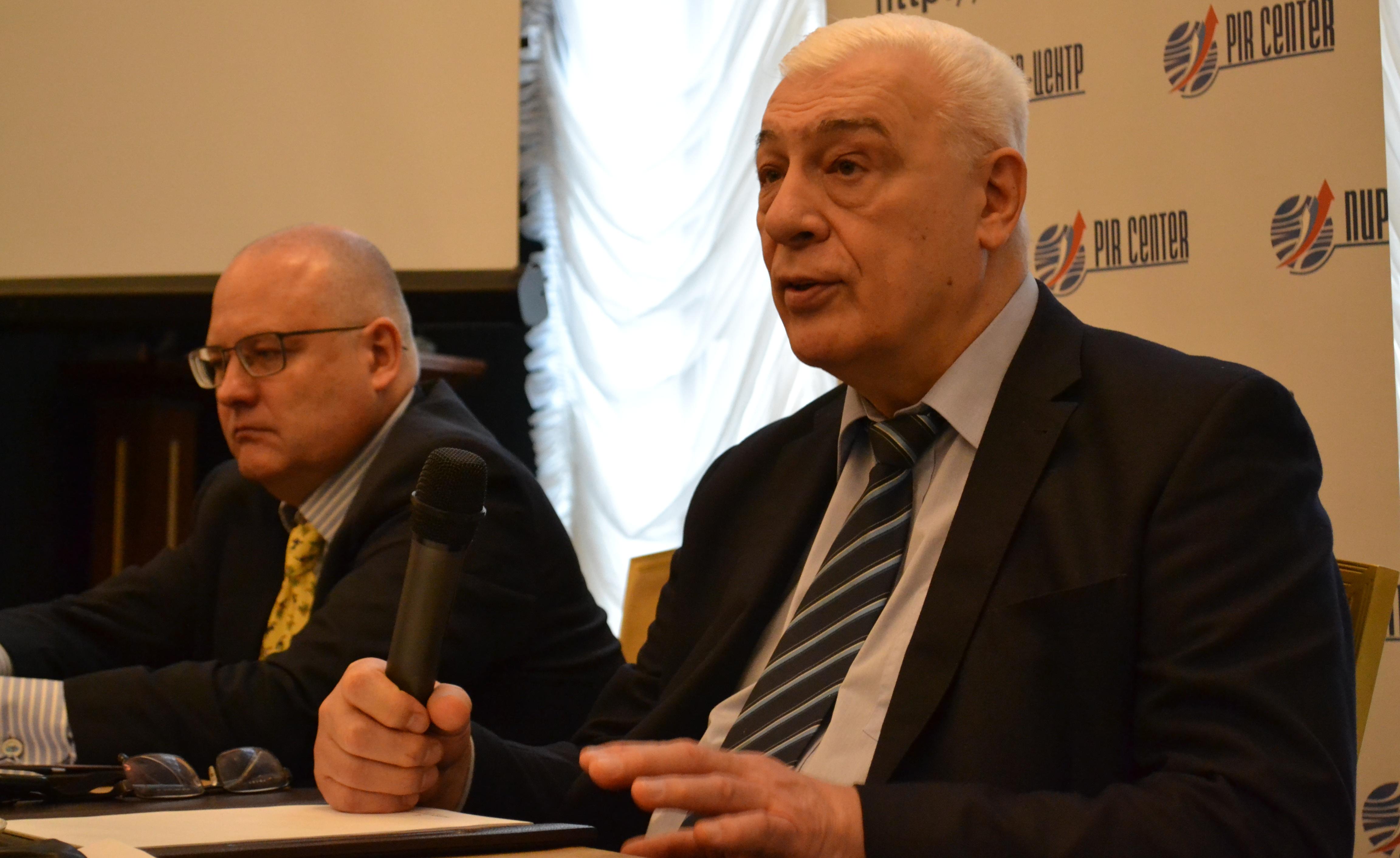 MILITARY AND POLICY RESULTS OF 2024 WERE SUMMARISED AT THE 124TH WINTER SESSION OF THE TRIALOGUE CLUB INTERNATIONALDecember 18, 2024
MILITARY AND POLICY RESULTS OF 2024 WERE SUMMARISED AT THE 124TH WINTER SESSION OF THE TRIALOGUE CLUB INTERNATIONALDecember 18, 2024The 124th Winter Session of the Trialogue Club International took place in Moscow. Traditionally, Dr. Vladimir Orlov, Founding President of the Trialogue Club International, Founding Director of PIR Center, and Professor at MGIMO University, delivered his opening remarks.
The Session was held in a panel discussion format. The keynote speaker was Gen. Evgeny Buzhinsky, Co-Chair of the Trialogue Club International and Chairman of PIR Center’s Executive Board. During his speech, he provided a summary of the findings and lessons learned from 2024; and addressed most recent developments in international security including the Ukraine crisis.
«My strong belief is that dialogue is better than non-dialogue. I hope that after the end of the great crisis, something will improve our bilateral relations», - Gen. Buzhinsky stressed referring to Russian-American relations. “Unless the common environment in our relations with Western states, particularly in the context of U.S.-Russia bilateral ties, improves, we will be unable to continue or resume talks on strategic offensive weapons and other aspects of strategic stability," — Lieutenant-General (ret.) Evgeny Buzhinsky further noted.
After the keynote speech, a traditional Q&A session took place. The discussion was moderated by Dr. Vladimir Orlov, President of the Trialogue Club International and Director of PIR Center. The agenda generated great interest among the audience. As the meeting was held under Chatham House rules, we are unable to provide further details of the discussion at the Club.
Following the Session, Club members and special guests were invited to an informal reception, where they continued discussing the critical issues of the Session’s agenda. Additionally, the Security Index Yearbook 2024/2025 Global Edition was presented to permanent members and special guests of the Trialogue Club International during the reception.
The Session was attended by members of the Trialogue Club International as well as by special guests of the President of the Club. “I am particularly happy today to welcome as our special guests diplomats from Argentina, Brazil, Egypt, Azerbaijan, and Uzbekistan”, - President of the Club Dr. Orlov noted. Also, diplomats from the United States, France, Germany, EU Delegation, Japan, New Zealand, Romania, Singapore, Sweden, Switzerland, Red Cross Delegation, among others, were present.
THE SECURITY INDEX OCCASIONAL PAPER SERIES CAME OUT WITH THE NEW REPORT "TECHNOLOGICAL RENAISSANCE IN SUB-SAHARAN AFRICA: CHALLENGES AND OPPORTUNITIES FOR RUSSIA" BY DR. LEONID TSUKANOV
December 16, 2024This occasional paper takes a look at the potential of Sub-Saharan African (SSA) states in the field of high technologies and the prospects for promoting Russia’s interests in this area. The research focused on studying several categories within the high-tech group, to which Moscow pays increased attention (cybersecurity and emerging technologies, energy, space research, biotechnology). The long-term interests of the SSA States and their achievements in each high-tech sphere, as well as the level of their cooperation with Russia and other global leaders, are assessed.
Key findings:
1) The technological dimension of Sub-Saharan African countries is in a phase of active transformation. The majority of regional states view the high-tech sector as a potential area for development and express readiness to invest in its advancement. However, only a smaller portion of them has sustainable positions. The most active players capable of operating in high tech industries on a global level include South Africa, Nigeria, Ghana, and Kenya.
2) There is a clear trend towards the transfer of the palm in the competition for influence in the African technological sector to Asian states – and first of all, to China. On the other hand, Western countries still have fairly strong positions in a significant part of sensitive areas, including digital technologies and pharmaceuticals.
3) Overall, favorable conditions have emerged in the region for Russia to increase its presence in the national high-tech markets – primarily in the areas of cybersecurity, E-Gov, electronic education, as well as atomic and hydro energy.
4) Russia is less subject to the influence of colonial discourse than most competitors, but it faces other restraining factors. Moscow is still in a catch-up position in the race for influence in Sub-Saharan Africa, which is due, among other things, to the long period of absence of stable conductors of Russian interests in the region.
The report has been prepared within the framework of the «Global Security, Strategic Stability, and Arms Control» Project under the auspices of the «Priority-2030» Strategic Academic Leadership Program. THE SECURITY INDEX OCCASIONAL PAPER SERIES CAME OUT WITH THE NEW REPORT "ON BOTH SIDES OF THE PERSIAN GULF: THE GROWTH OF THE REGION’S HIGH-TECH INDUSTRY AND RUSSIA’S INTERESTS" BY DR. LEONID TSUKANOVDecember 4, 2024
THE SECURITY INDEX OCCASIONAL PAPER SERIES CAME OUT WITH THE NEW REPORT "ON BOTH SIDES OF THE PERSIAN GULF: THE GROWTH OF THE REGION’S HIGH-TECH INDUSTRY AND RUSSIA’S INTERESTS" BY DR. LEONID TSUKANOVDecember 4, 2024This occasional paper takes a look at the potential of the Persian Gulf states in the field of high technology and the prospects for promoting Russia’s interests in this area. The research focused on studying several categories within the high-tech group, to which Moscow pays increased attention (cybersecurity and emerging technologies, energy, space research, biotechnology). The long-term interests of the Gulf States and their achievements in each high-tech sphere, as well as the level of their cooperation with Russia and other global leaders, are assessed.
Key findings:
1) The technological segment of the region’s economies is rapidly evolving, with the vast majority of states predictably seeking to strengthen their positions in the high-tech market — either in all directions at once (Saudi Arabia, the UAE), or in specific niches (Qatar, Bahrain, Oman). However, the desire to procure ready-made solutions rather than produce their own still prevails.
2) The countries of the region are focused on individual megaprojects, with the implementation of collective initiatives hindered by internal and external factors, as well as the exclusion of some actors (Iran, Iraq). Another specific feature of the region is the formation of an alternative center (Iran), aimed at complete technological self-sufficiency and de facto a counterweight to the combined potential of the GCC.
3) External players’ competition is escalating, with new countries entering the market competition. China, the USA, and India demonstrate the most activity in this regard. The interests of EU countries, Israel, and Türkiye are represented to a lesser extent.
4) The warming of relations between Iran and the Gulf monarchies has somewhat reduced the friction between the two poles, but there is a high probability that other interested parties (the United States, Israel) will try to upset the fragile balance.
5) The region has all the necessary conditions for Russia to gradually increase its presence there. The most promising areas under current conditions include the markets of financial technologies (FinTech) and digital education (EdTech), digital protection of critical infrastructure (cybersecurity), and the biotechnology market (with an emphasis on advanced pharmaceuticals). Moreover, premises have emerged for strengthening Moscow’s positions in the regional nuclear energy market.
The report has been prepared within the framework of the «Global Security, Strategic Stability, and Arms Control» Project under the auspices of the «Priority-2030» Strategic Academic Leadership Program.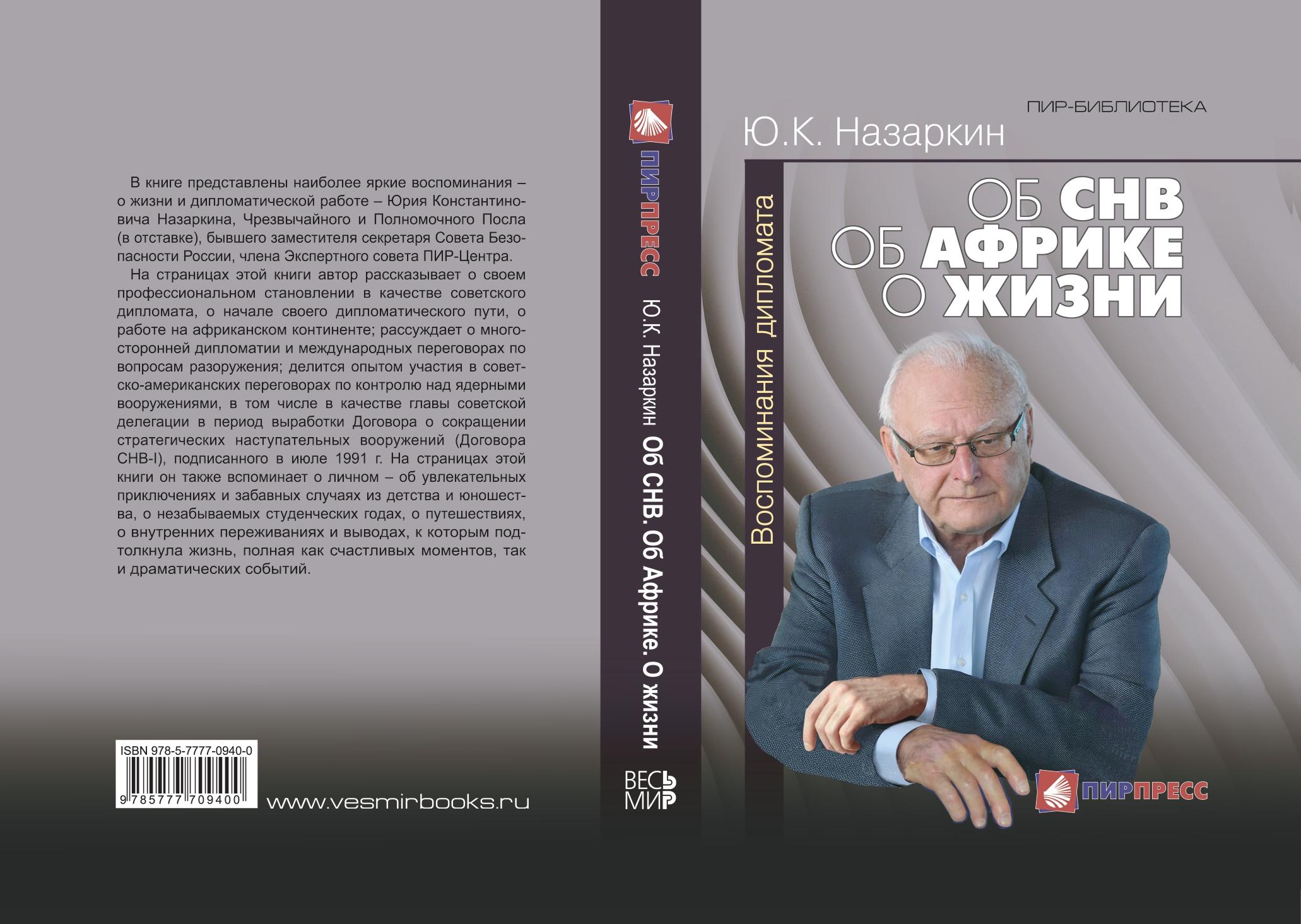 THE «VES MIR» PUBLISHING HOUSE RELEASED THE MEMOIRS OF AMBASSADOR YURI NAZARKIN, «ON THE START. ON AFRICA. ON LIFE. MEMOIRS OF A DIPLOMAT,» AS PART OF THE PIR LIBRARY SERIESJuly 31, 2024
THE «VES MIR» PUBLISHING HOUSE RELEASED THE MEMOIRS OF AMBASSADOR YURI NAZARKIN, «ON THE START. ON AFRICA. ON LIFE. MEMOIRS OF A DIPLOMAT,» AS PART OF THE PIR LIBRARY SERIESJuly 31, 2024«We, the PIR Library Series editorial team, did not try to hide somewhat politically incorrect passages in the book. We wanted you to hear the author’s voice – for what it is – and the life of a diplomat – as it is. In Nazarkin’s memoirs, you will find few toasts but a lot of criticism. It will not resemble pensioner grumbling (oh, and the fervently ironic Yuri Konstantinovich is not even close to a bored pensioner!), but clear – and often direct and straightforward – critical judgments,» – from the Foreword by Dr. Vladimir Orlov, Founding Director of PIR Center, to the memoirs «On the START. On Africa. On Life. Memoirs of a Diplomat».
PIR Center is pleased to announce the release of Amb. Yuri Nazarkin’s memoirs (in Russian), “On the START. On Africa. On Life. Memoirs of a Diplomat.” The book is published in collaboration with the “Ves Mir” publishing house and with the support of the Presidential Grant Foundation as part of the PIR Center project “Global Security: A View from Russia for the Youth Around the World.”
Amb. Yuri Nazarkin is a former Russian diplomat and statesman: Ambassador Extraordinary and Plenipotentiary of the USSR and the Russian Federation, representative of the USSR at the Conference on Disarmament (1987-1989), head of the Soviet delegation to negotiations with the United States on nuclear and space weapons (1989-1991), Deputy Secretary of the Security Council of the Russian Federation (1992-1995). The publication of the new book within the “PIR Library” series is timed to coincide with the 30th anniversary of the entry into force of the Strategic Offensive Arms Reduction Treaty, or START-I, which was achieved with the participation of Ambassador Nazarkin as head of the Soviet delegation at the respective Soviet-American negotiations. It was signed on July 31, 1991, and entered into force on December 5, 1994, enduring such significant turmoil as the Soviet Union collapse and the resolution of the issue of the Soviet nuclear legacy.
In his book, the author speaks about his professional development as a Soviet diplomat, the beginning of his diplomatic career, and working on the African continent; he talks about multilateral diplomacy and international negotiations on disarmament issues and shares his experience of participating in Soviet-American talks on nuclear arms control, including the time when he was heading the Soviet delegation during the drafting of the Strategic Offensive Arms Reduction Treaty (START I Treaty), signed in July 1991. Throughout the book, the author recalls personal life – fascinating adventures, funny childhood and adolescence stories, unforgettable student years, travel trips, and inner emotional concerns and conclusions ruled by a life full of both happy moments and dramatic events.
The book “On the START. On Africa. On Life. Memoirs of a Diplomat” will be insightful for a wide range of readers interested in nuclear nonproliferation and arms control, including the negotiation processes, the diplomatic service, and Russian diplomacy. International relations and global security experts will find it especially valuable.
The avant-premiere of the book took place at the PIR Center XXIII International School on Global Security. The memoirs’ official launch will take place at a series of events in Moscow and internationally between October and December this year, with December 5, 2024, the 30th anniversary of the START I Treaty, in mind. The book’s digital version is available in the respective section (in Russian) of the project “Oral History of Nuclear Nonproliferation.”
Some of our friends and colleagues have already shared their views and opinions about the book.
“I am glad for the opportunity to read the memoirs of my former boss (Geneva, from 1989 to 1991). I would strongly recommend the book by Ambassador Nazarkin to all those preparing for a diplomatic career or who are generally interested in international relations. The book presents the vividly written memoirs of a widely experienced and wise person, which allows us to understand the past and draw conclusions for the future,” – Dr. Dmitry Trenin, Senior Research Fellow at the Nonproliferation and Arms Control Sector of the Center for International Security of IMEMO RAS, Research Professor at HSE University, Academic Supervisor for World Military Economy and Strategy at HSE University, member of PIR Center Executive Board.
“The memoirs of Ambassador Nazarkin, released by PIR Center, are worth reading to anyone interested in the history of Russian diplomacy, including the hitherto unknown details of negotiations between Moscow and Washington on the arms control issues. Unlike colleagues from abroad, Soviet/Russian diplomats, unfortunately, write memoirs rarely; the more valuable and interesting books, such as Yuri Nazarkin’s memoirs, are,” – Dr. Elena Chernenko, Co-Chair of the Trialogue Club International, Special Correspondent of the Kommersant Daily, member of the PIR Center Executive Board.
“Yuri Nazarkin’s memoirs are an excellent example of the book of an old–school diplomat. It is full of humor and inner freedom. It uniquely illustrates the changes in the culture of the Soviet/Russian Ministry of Foreign Affairs (as well as the immutability of some features that inhibit development). Apart from vivid sketches of the traveler and notes of the meetings with prominent foreign politicians and diplomats, the author reveals the behind-the-scenes work on disarmament issues. In this respect, Nazarkin’s approaches can be useful to the current generation of negotiators,” – Dr. Dmitry Polikanov, Deputy Head of Rossotrudnichestvo.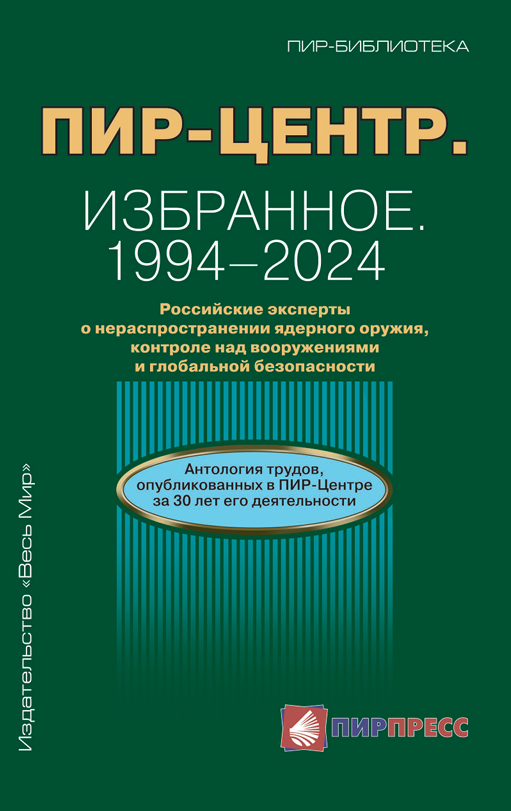 ON THE BIRTHDAY OF YADERNY KONTROL – THE RHINO DAY – PIR CENTER IS PLEASED TO ANNOUNCE THE RELEASE OF THE ANTHOLOGY “PIR CENTER. SELECTED WORKS. 1994-2024”November 15, 2024
ON THE BIRTHDAY OF YADERNY KONTROL – THE RHINO DAY – PIR CENTER IS PLEASED TO ANNOUNCE THE RELEASE OF THE ANTHOLOGY “PIR CENTER. SELECTED WORKS. 1994-2024”November 15, 2024“In compiling this Anthology, we aimed not only to uphold the principles of work quality and lasting relevance but also to adhere to the principles of authorial and editorial diversity. What do I mean by this? The principle of authorial diversity means that, out of respect for our regular contributors, we endeavored to limit each author’s representation in the Anthology to no more than one, or in rare cases, two pieces. Meanwhile, the principle of editorial diversity required us to select articles, book chapters, and report excerpts not merely from one or two core PIR Center publications (we could have easily limited ourselves to Yaderny Kontrol and Security Index) but from the entire body of our publications, spanning the 30 years of PIR Center’s activity,” – from the Foreword by Dr. Vladimir Orlov, Founding Director of PIR Center, to the Anthology “PIR Center. Selected Works. 1994-2024.”
On November 15, 1994, 30 years ago, the first issue of the Yaderny Kontrol (in Russian) journal was published. Yaderny Kontrol was the predecessor of the Security Index, published as a journal from 2007 to 2016, and, since 2019, in the format of an Occasional Paper Series and the e-journal Yaderny Kontrol (in Russian). The Yaderny Kontrol journal has been recognized by the Russian and international establishment and the expert community as a source of exclusive analytical information on global security issues.
A rhinoceros from an engraving by the German artist Albrecht Dürer Rhinoceros (1515) became the journal’s symbol. Despite their apparent invulnerability, three out of five rhino species are on the verge of extinction, embodying a security paradox.
PIR Center’s publishing activities are inextricably linked with educational projects on nuclear nonproliferation, arms control, disarmament, and global and regional security. Therefore, in 2024, to commemorate the birthday of the Yaderny Kontrol journal – the Rhino Day – PIR Center is pleased to announce the release of the Anthology “PIR Center. Selected Works. 1994-2024.” The book has been published in partnership with the “Ves’ Mir” publishing house and with the support of the Presidential Grants Foundation. The digital version of the book is available here (in Russian).
The Anthology features selected articles, analytical materials, and expert interviews published over the past 30 years under the auspices of PIR Center. These works reflect the evolution of perspectives on nuclear nonproliferation, arms control, and global security issues. Readers will find scholarly and practical works addressing challenges and threats to the NPT, as well as efforts to strengthen it; the provision of nuclear security; prospects for developing nuclear energy in Russia and worldwide; and a range of other pressing issues in global and regional security.
A substantial section of the materials in the Anthology is dedicated to military-political issues: maintaining strategic stability, countering the threat of terrorism (including the use of weapons of mass destruction), challenges to European security, the development of combat drones and robotics, military-technical cooperation, conventional arms regulation, and more. The Anthology’s authors also closely examine the shaping of a new world order and the significance of these processes for Russian foreign and defense policy. Readers may be surprised by how accurately relevant articles written ten, twenty, or even thirty years ago remain today.
This publication is intended for specialists, students, and graduate students in fields such as international relations, international security, Russian diplomacy, foreign policy, and the history of international relations, as well as for a broader audience – anyone seeking to deepen their understanding of the evolution of global and regional processes during the era of significant geopolitical shifts from the 1990s to the 2020s and to see how leading Russian scholars and practitioners have assessed this evolution.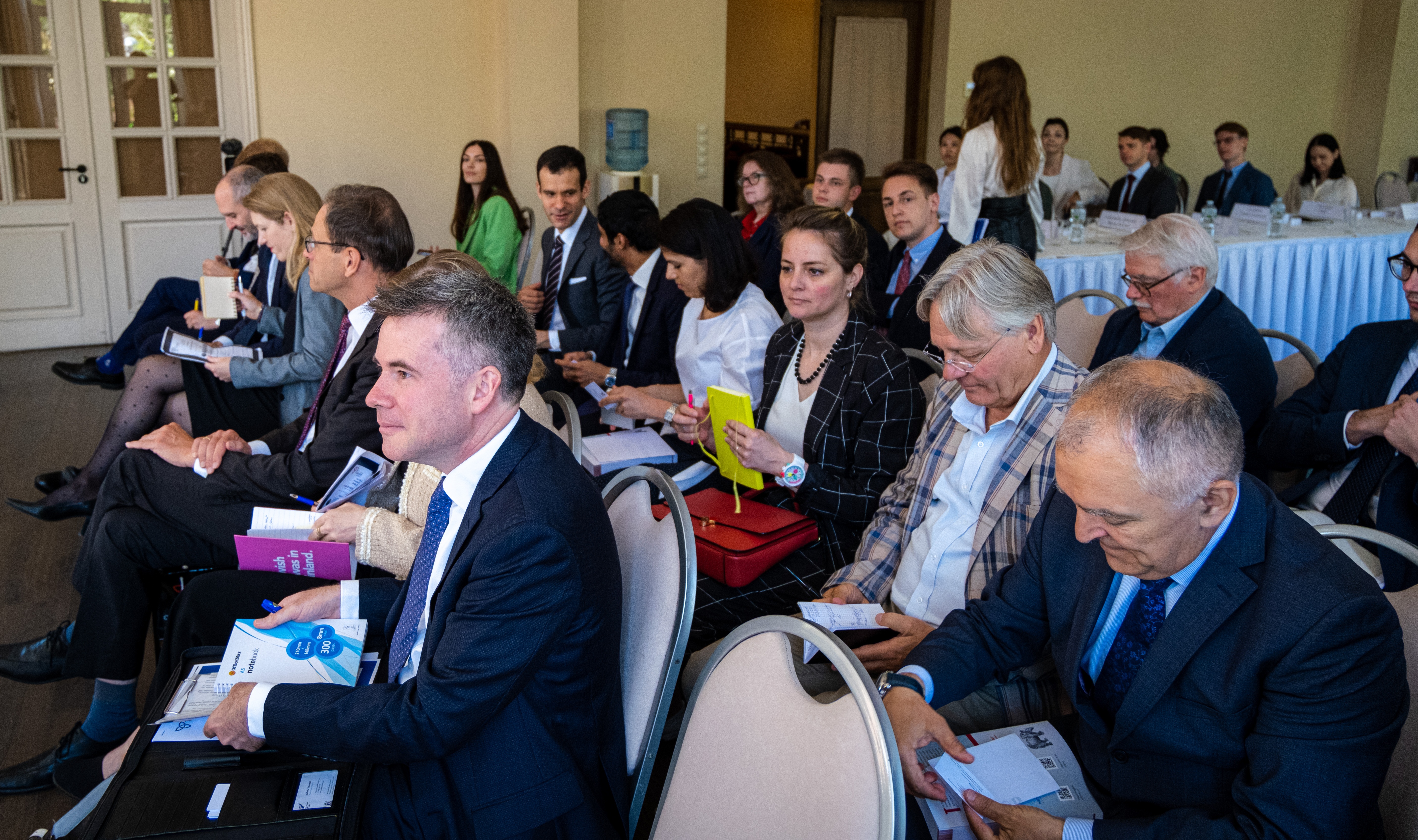 THE TRANSFORMATIVE NATURE OF GLOBAL ORDER AND ITS KEY PLAYERS WAS DISCUSSED AT THE 123RD EXTENDED SESSION OF THE TRIALOGUE CLUB INTERNATIONALJune 27, 2024
THE TRANSFORMATIVE NATURE OF GLOBAL ORDER AND ITS KEY PLAYERS WAS DISCUSSED AT THE 123RD EXTENDED SESSION OF THE TRIALOGUE CLUB INTERNATIONALJune 27, 2024On June 27, 2024, the 123rd Extended Session of the Trialogue Club International took place in Zvenigorod, merging two panel discussions on the topics of (1) "The Shadow of the Third World War? Transformation Processes in the International Arena and Their Key Participants" and (2) "Shifting Roles: Alliances and Foes in the Face of Global Turbulence."
Traditionally, Dr. Vladimir Orlov, Founding President of the Trialogue Club International, Founding Director of PIR Center, Professor at MGIMO University & Editor-in-Chief of the Security Index Yearbook, delivered his welcoming speech.
Both sessions were held in a panel discussion format. The first one included Gen. Evgeny Buzhinskiy, who also served as a moderator; Dr. Dmitry Evstafiev, Professor of the Department of Theory of Law and State, Peoples’ Friendship University of Russia; Dr. Vladimir Orlov; and Dr. Dmitry Trenin, Research Professor and Academic Supervisor for World Military Economy and Strategy at Higher School of Economics; Member of PIR Center Executive Board. Discussants focused on escalating tensions between Russia and the West, the risk of global conflict, and shifts in the world order, highlighting the dangers of miscalculated escalation and the re-emergence of nuclear deterrence as a strategic factor.
After the main remarks, a traditional Q&A session took place, moderated by Gen. Evgeny Buzhinskiy, Co-Chair of the Trialogue Club International and Chairman of PIR Center Executive Board.
The second session featured Dr. Andrey Kortunov, Academic Director of the Russian International Affairs Council and PIR Center Advisory Board member, and Dr. Dmitry Trenin. The discussion centered on the prolonged global crisis, shifts in international order, and diminishing prospects for traditional power transitions. Panelists explored the rise of a decentralized global order shaped by practical cooperation on shared challenges, including resource scarcity, migration, and technological advancements. Dr. Vladimir Orlov moderated the panel and Q&A session.
About 50 people attended the event, including permanent members of the Trialogue Club International, particularly representatives of the Embassies of Australia, Finland, Germany, Romania, Sweden, and Switzerland, and the International Committee of the Red Cross Delegation in Moscow. The attendees' list also included special guests from the Embassies of Qatar and Brazil as well as independent experts and analysts.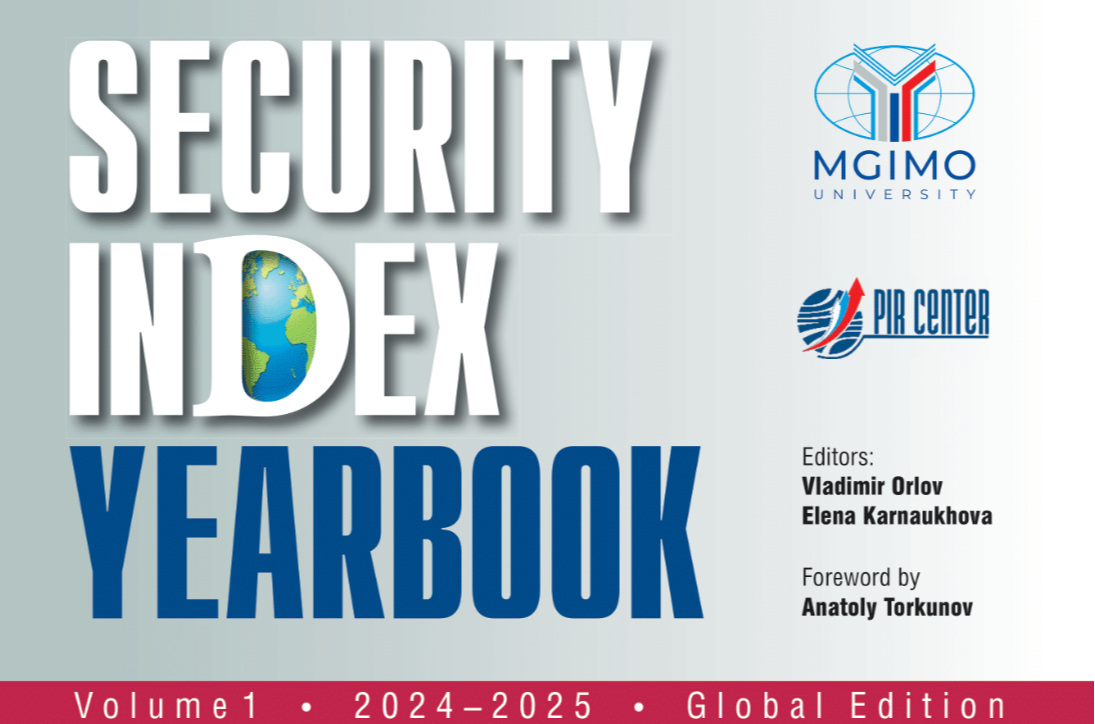 LAUNCH OF THE SECURITY INDEX YEARBOOK DURING THE 123RD EXTENDED SESSION OF THE TRIALOGUE CLUB INTERNATIONAL IN ZVENIGORODJune 27, 2024
LAUNCH OF THE SECURITY INDEX YEARBOOK DURING THE 123RD EXTENDED SESSION OF THE TRIALOGUE CLUB INTERNATIONAL IN ZVENIGORODJune 27, 2024On June 27, 2024, PIR Center has hosted the first global launch of the new must-read for all security aficionados – Security Index Yearbook 2024-2025 Global Edition during the 123rd Extended Session of the Trialogue Club International in Zvenigorod.
The Security Index Yearbook is a unique collection of analytical materials on the most burning issues of the global and regional agendas in times of growing international tension and Russian approaches to them. It highlights the issues of global concern such as international terrorism, nuclear weapons and strategic arms control agenda, nonproliferation of weapons of mass destruction, new types of conventional weapons, space security, and cyber diplomacy.
Regarding regional security, it concentrates on Sino-Russian relations, the Middle East, Russian-Iranian relations, the assessment of BRICS prospects, new developments in the relations between Russia and African countries, and the security dialogue between Russia and the states of Latin America, to mention just a few. It also contains book reviews and the chronology of recent global and regional security events.
After the welcoming remarks, delivered by Dr. Vladimir Orlov, Founding President of the Trialogue Club International, Founding Director of PIR Center, Professor at MGIMO University & Editor-in-Chief of the Security Index Yearbook, leading Russian experts, authors of the Security Index Yearbook, shared their thoughts and views on the current situation and topical issues of international relations.
In particular, the launch was highlighted by speeches from Dr. Dmitry Trenin, Senior Research Fellow at the Nonproliferation and Arms Control Sector of the Center for International Security of IMEMO RAS, Research Professor at HSE University, member of PIR Center Executive Board; Dr. Dmitry Evstafiev, Professor of the Department of Theory of Law and State at Peoples’ Friendship University of Russia; Dr. Andrey Kortunov, Academic Director of the Russian International Affairs Council.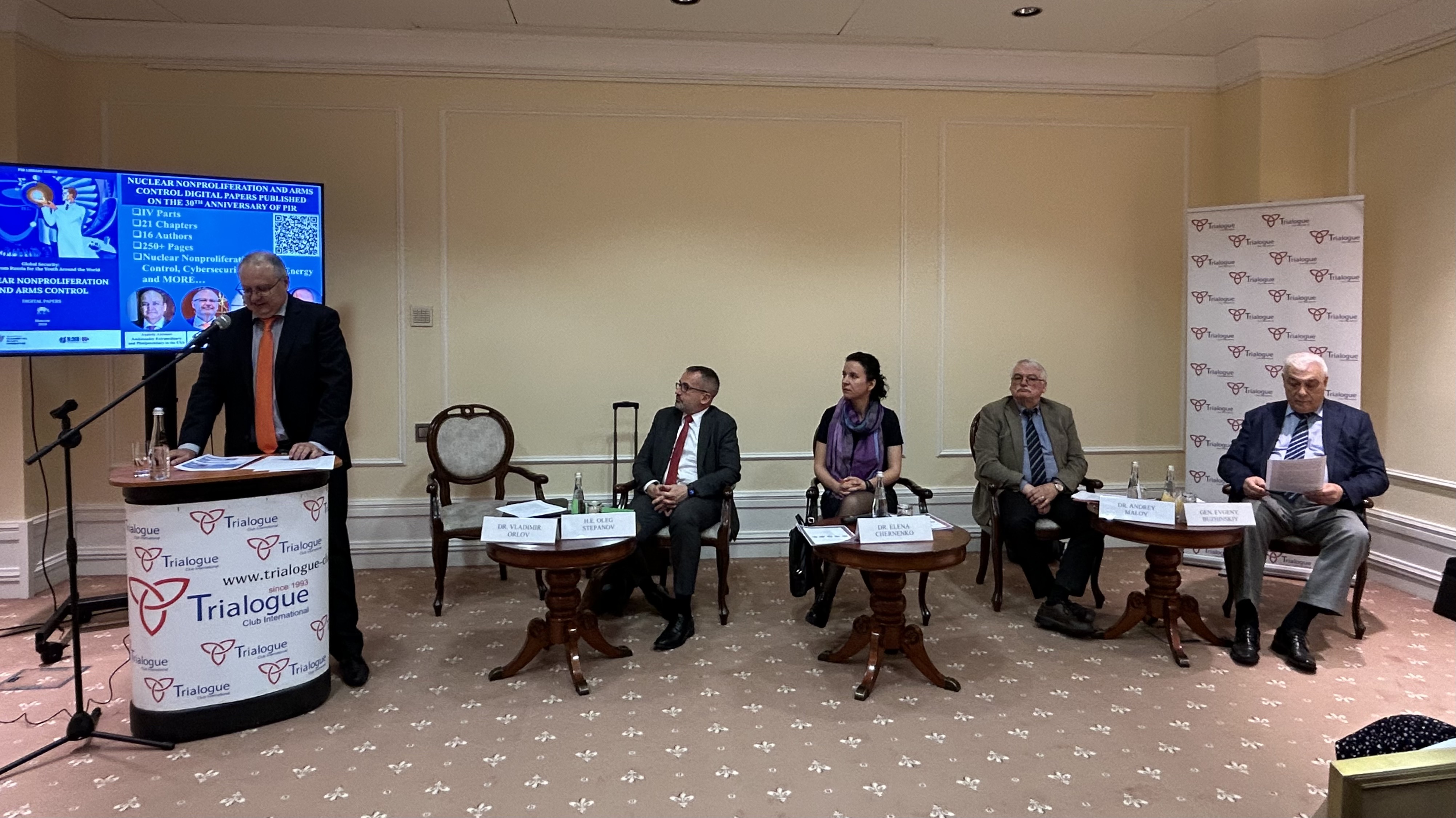 THE FUTURE OF STRATEGIC STABILITY AND ARMS CONTROL WERE DISCUSSED AT THE 122ND SUMMER SESSION OF THE TRIALOGUE CLUB INTERNATIONALMay 15, 2024
THE FUTURE OF STRATEGIC STABILITY AND ARMS CONTROL WERE DISCUSSED AT THE 122ND SUMMER SESSION OF THE TRIALOGUE CLUB INTERNATIONALMay 15, 2024On May 15, 2024, the 122nd Summer Session of the Trialogue Club International on the topic "Assessing Strategic Stability and Arms Control in the New International Environment" took place in Moscow.
Traditionally, Dr. Vladimir Orlov, Founding President of the Trialogue Club International, Founding Director of PIR Center, Professor at MGIMO University, delivered his welcoming remarks.
The Session was held in a panel discussion format. The keynote speakers were Gen. Evgeny Buzhinskiy, Co-Chair of the Trialogue Club International, Chairman of PIR Center’s Executive Board; Dr. Andrey Malov, Member of PIR Center’s Advisory Board; Dr. Vladimir Orlov, Founding President of the Trialogue Club International, Founding Director of PIR Center, Professor at MGIMO University; and H.E. Oleg Stepanov, Member of PIR Center’s Advisory Board, Ambassador Extraordinary and Plenipotentiary of the Russian Federation to Canada, Director of Foreign Policy Planning Department in the Ministry of Foreign Affairs of the Russian Federation (2016-2021).
After the main speeches, a traditional Q&A session took place. The discussion was moderated by Dr. Elena Chernenko, Co-Chair of the Trialogue Club International, Special Correspondent of the Kommersant Daily, member of PIR Center’s Executive Board.
The Session was attended by permanent members and special guests of the Trialogue Club International. Among them, in particular, were representatives of military and/or political departments of Finland, Germany, Japan, New Zealand, Norway, Romania, Singapore, Sweden, Switzerland, Turkmenistan, the US in Russia, the Regional Delegation of the International Committee of the Red Cross in Moscow, etc., as well as domestic experts and analysts.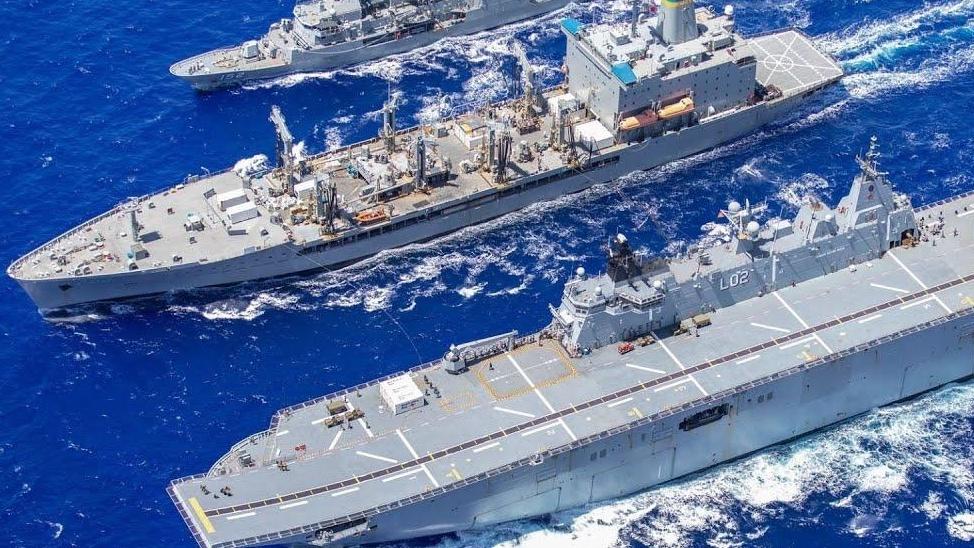
THE SECURITY INDEX OCCASIONAL PAPER SERIES CAME OUT WITH THE NEW REPORT "DEALING WITH THE ROYAL AUSTRALIAN NAVY’S SSN CAPABILITY: RISK REDUCTION OPTIONS" BY MR. VLADIMIR LADANOV №2 (42)
April 26, 2024This research paper examines the implications of the emergence of the Royal Australian Navy’s (RAN’s) nuclear-powered submarine (SSN) capability for Russia’s security, namely the safety of its submarine-based strategic nuclear deterrent operated by the Pacific Fleet from its base in Vilyuchinsk on the Kamchatka Peninsula. As a result of such analysis, potential risk reduction measures will be set forth to be explored with Australia in due course.
This report is published within the framework of the project “Global Security: A View from Russia for the Youth Around the World” (with the support of the Presidential Grants Foundation).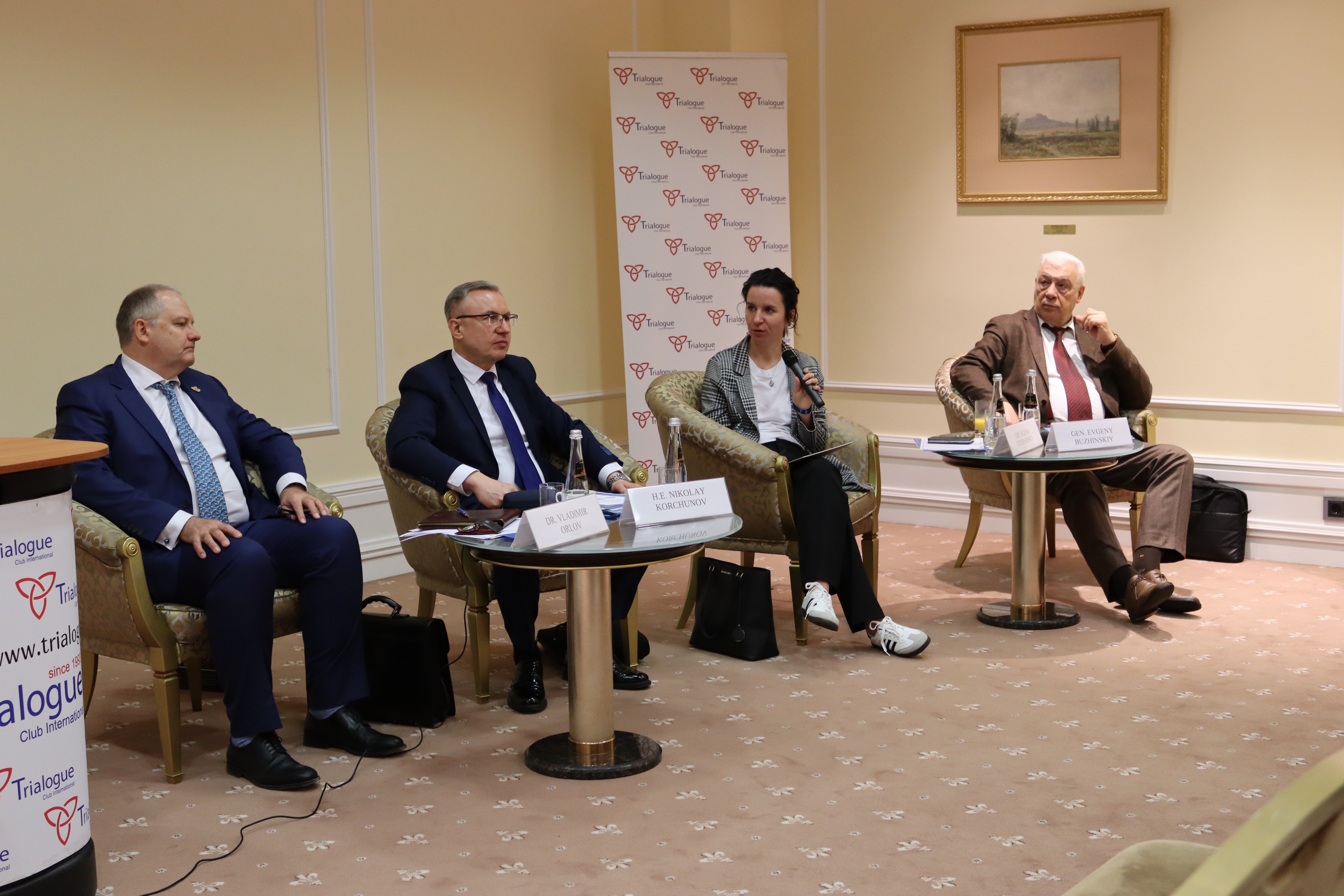 THE CURRENT STATE AND THE PROSPECTS FOR INTERNATIONAL COOPERATION IN THE ARCTIC WERE DISCUSSED AT THE 121ST SPRING SESSION OF THE TRIALOGUE CLUB INTERNATIONALApril 3, 2024
THE CURRENT STATE AND THE PROSPECTS FOR INTERNATIONAL COOPERATION IN THE ARCTIC WERE DISCUSSED AT THE 121ST SPRING SESSION OF THE TRIALOGUE CLUB INTERNATIONALApril 3, 2024On April 3, 2024, the 121st Spring Session of the Trialogue Club International took place in Moscow. The agenda of the Session was formulated as follows "Arctic — the Territory of Cooperation or Confrontation?".
Traditionally, Dr. Vladimir Orlov, Founding President of the Trialogue Club International, PIR Center Founding Director, Professor at MGIMO University, delivered his welcoming remarks. During the speech, he highlighted the significance of the agenda in ensuring and maintaining global and regional security. Moreover, Dr. Vladimir Orlov presented the main news based on the educational and scientific activities of PIR Center.
Ambassador Nikolay Korchunov, Ambassador-at-Large at the Russian Foreign Ministry, Senior Arctic Official of Russia to the Arctic Council, addressed the Session as a keynote speaker. Lieutenant General Evgeny Buzhinskiy, Co-Chair of the Trialogue Club International, Chairman of PIR Center Executive Board, provided a commentary on the military-political aspects of the discussed issues.
After the main speech, a traditional Q&A session took place. The Session was moderated by Dr. Elena Chernenko, Co-Chair of the Trialogue Club International, Special Correspondent of the Kommersant Daily, Member of PIR Center Executive Board.
The Session was attended by permanent members of the Trialogue Club International. Among them were representatives of the Embassies of Finland, Germany, Japan, Mozambique, New Zealand, Singapore, Sweden, Switzerland, the USA to Russia, the International Committee of the Red Cross Delegation in Moscow, etc., as well as special guests. December 04, 2023
December 04, 2023The geopolitical realities are influenced and changed by technological and technical advancement. As we stand on the brink of the Fourth Industrial Revolution, the emergence of new opportunities and challenges is inevitable. However, nearly all modern innovations are based on semiconductors.
This research analyses the potential of the Russian semiconductor industry to assess the technological and technical capacity of an actor in international relations. Methods of SWOT analysis and questionnaires among experts are used to get clearer estimations about the industrial environment of semiconductors in Russia.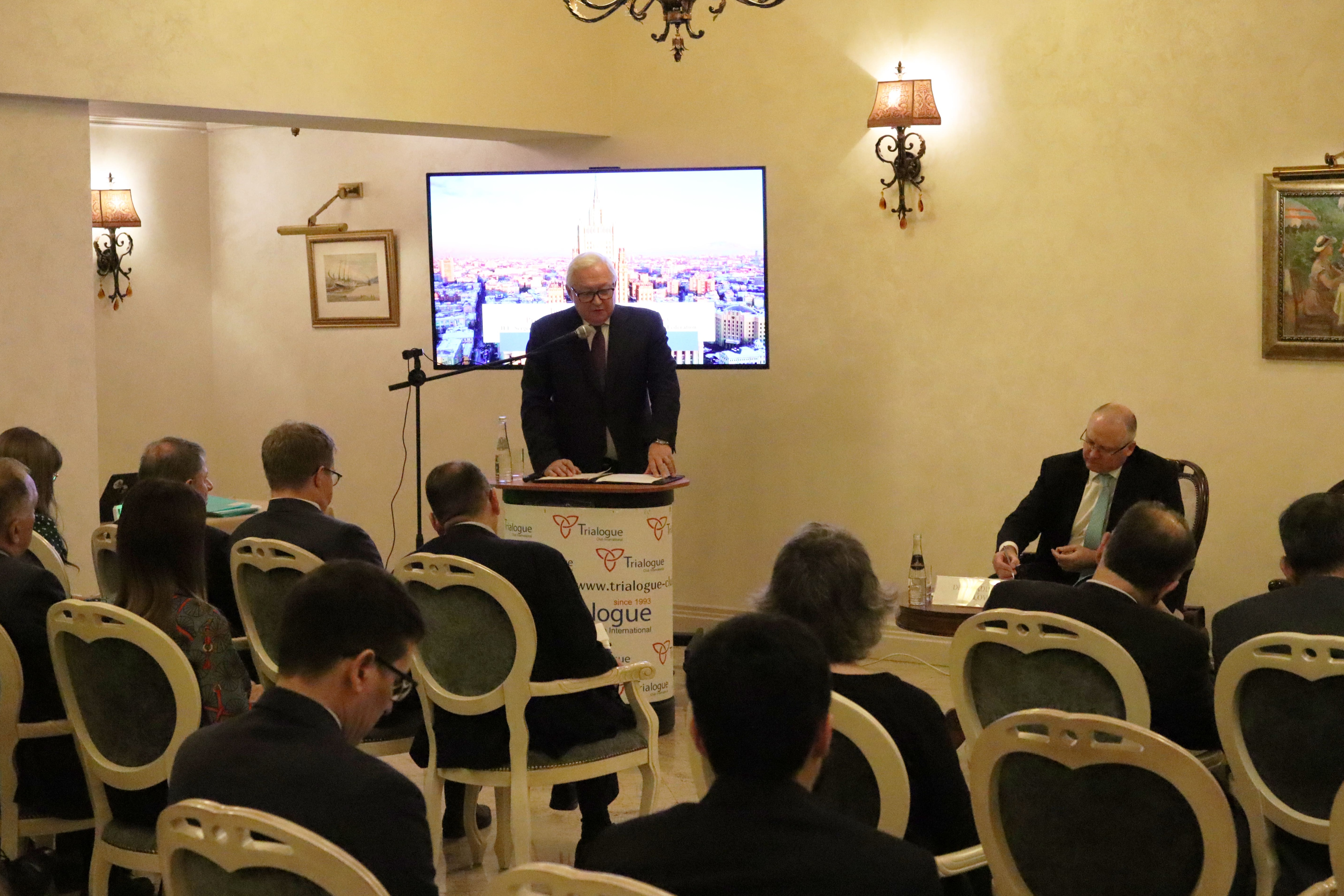 THE PROSPECTS FOR THE RUSSIAN FOREIGN POLICY TOWARDS MULTIPOLARITY WERE DISCUSSED AT THE 120TH WINTER SESSION OF THE TRIALOGUE CLUB INTERNATIONALNovember 1, 2022
THE PROSPECTS FOR THE RUSSIAN FOREIGN POLICY TOWARDS MULTIPOLARITY WERE DISCUSSED AT THE 120TH WINTER SESSION OF THE TRIALOGUE CLUB INTERNATIONALNovember 1, 2022On November 1, 2023, the 120th Winter Session of the Trialogue Club International took place in Moscow. The agenda of the Session was formulated as follows “Towards Multipolarity: Prospects for the Russian Foreign Policy”.
Traditionally, Dr. Vladimir Orlov, Founding President of the Trialogue Club International, Founding Director of PIR Center, Professor at MGIMO University, delivered welcoming remarks. During the speech, Dr. Orlov shared his views on the issue’s relevance to the international community, as well as presented the main news based on the educational and scientific activities of PIR Center.
H.E. Sergei Ryabkov, Deputy Foreign Minister of the Russian Federation, addressed the Session as a keynote speaker.
Following the main speech, the participants raised the most acute and controversial issues within the designated agenda during the traditional Q&A session and shared their comments and assessments. The agenda discussed aroused great interest among the audience; the theses announced initiated the subsequent exchange of views. In particular, the high-rank representatives of Finland, Germany, Israel, New Zealand, Norway, Singapore, and Switzerland to Russia shared their opinions on the issue.
Ms. Elena Chernenko, Co-Chair of the Trialogue Club International, Special Correspondent of the Kommersant Daily, Member of PIR Center Executive Board, moderated the event.
In total, about 60 people took part in the Session, more than 20 of whom are permanent members of the Trialogue Club International. Among them have been the representatives of the Military and (or) Political Representative Offices of Austria, Finland, Romania, and Switzerland, the representatives of the Embassies of Austria, Finland, France, Germany, Japan, New Zealand, Singapore, Sweden, Switzerland, and the US in Russia, the Regional Delegation of the International Committee of the Red Cross in Moscow, etc. The list of special guests included the representatives of the Embassies of Argentina, Australia, Brazil, Egypt, Ghana, India, Israel, Mexico, Mozambique, Norway, the Philippines, Qatar, the Republic of Korea, Rwanda, the Delegation of the European Union to Russia, etc., as well as independent experts and analysts.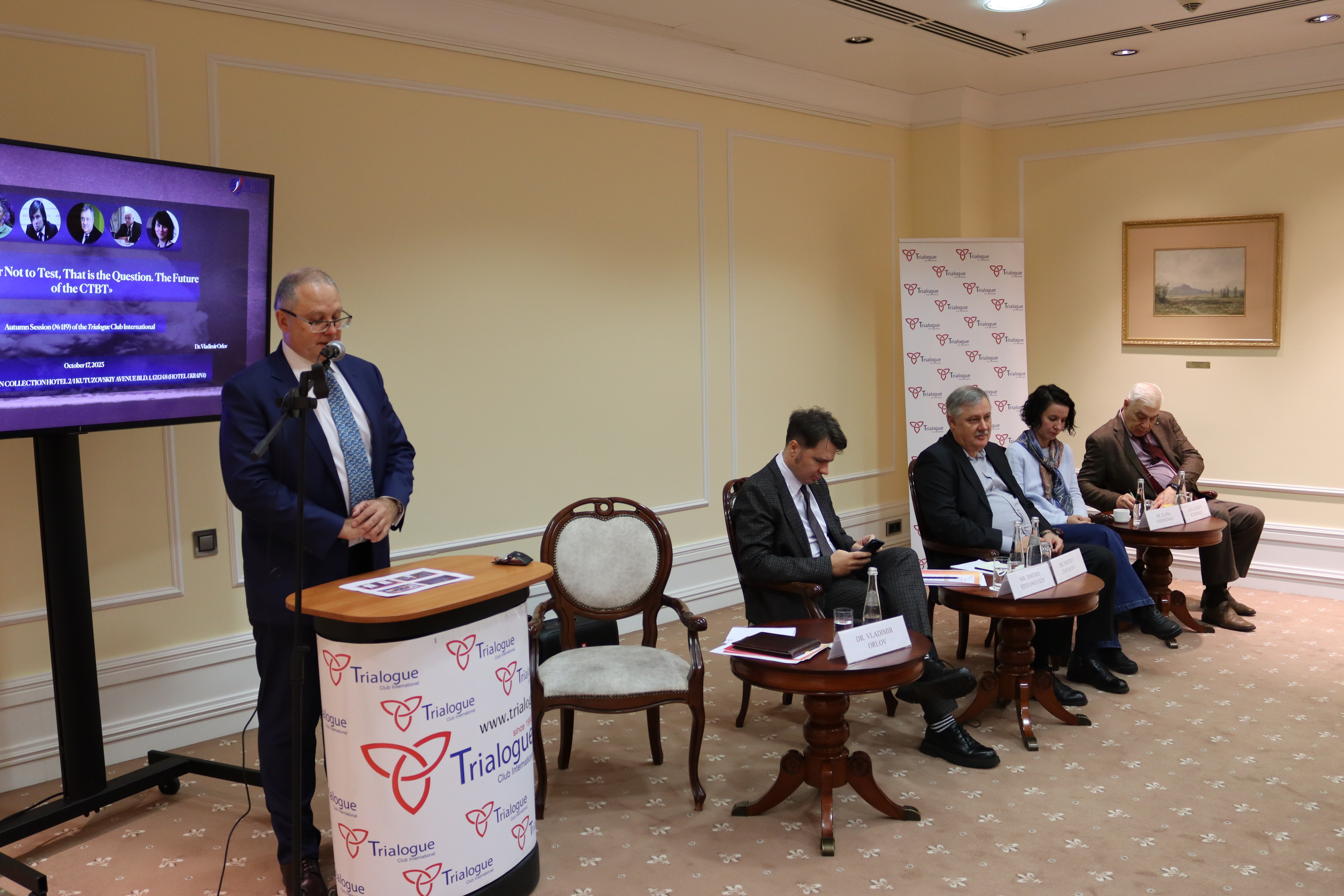 THE FUTURE OF THE CTBT WAS DISCUSSED AT THE 119TH AUTUMN SESSION OF THE TRIALOGUE CLUB INTERNATIONALOctober 17, 2023
THE FUTURE OF THE CTBT WAS DISCUSSED AT THE 119TH AUTUMN SESSION OF THE TRIALOGUE CLUB INTERNATIONALOctober 17, 2023On October 17, 2023, the 119th Autumn Session of the Trialogue Club International took place in Moscow. The agenda of the Session was formulated as follows “To Test, or Not to Test. That Is the Question”.
Dr. Vladimir Orlov, Founding President of the Trialogue Club International, Founding Director of PIR Center, Professor at MGIMO University, delivered welcoming remarks. During the speech, Dr. Vladimir Orlov shared his views on the issue’s relevance to the international community.
The Session was held in the panel discussion format. Mr. Dmitry Stefanovich, Research Fellow at the Center for International Security, IMEMO RAS; Member of PIR Center Advisory Board, addressed the Session as a keynote speaker. Dr. Dmitry Evstafiev, Professor of the Faculty of Creative Industries, Institute of Media, HSE University, made expert comments.
After the main speech, a traditional Q&A session took place, during which the participants had an opportunity to raise questions on the most pressing issues of the agenda, clarify the details, and also share their own comments. The theses announced provided a starting point for a heated discussion. In particular, independent expert Igor Vishnevetsky and representatives of the Embassies of Egypt, Japan, New Zealand, Singapore to Russia shared their views on the agenda of the Session.
The Session was co-moderated by the Club Co-Chairs Gen. Evgeny Buzhinskiy, Chairman of PIR Center Executive Board, who also shared his opinion on the discussed agenda, and Dr. Elena Chernenko, Special Correspondent of the Kommersant Daily, Member of PIR Center Executive Board.
About 50 people attended the Session, more than 20 of whom are permanent members of the Trialogue Club International. Among them are representatives of the Embassies of Austria, Finland, Germany, Japan, New Zealand, Romania, Singapore, Sweden, Switzerland, the USA to Russia, the International Committee of the Red Cross Delegation in Moscow. The list of special guests included representatives of the Embassies of Argentina, Brazil, India, Norway, the Republic of Ghana, the Republic of Korea, the Republic of Mozambique, Spain in Russia, the Delegation of the European Union to Russia, as well as independent experts and analysts.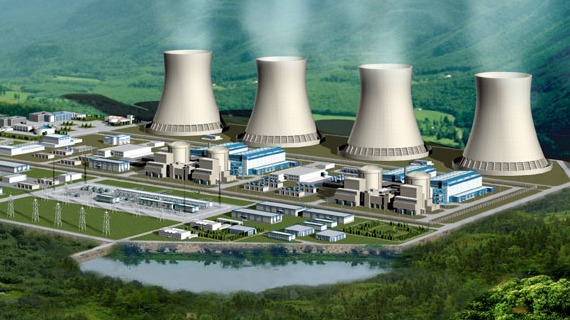 October 16, 2023
October 16, 2023Nuclear power stations offer long service life, steady electricity, low fuel costs, energy efficiency, weather independence, and zero carbon emissions. No wonder the Russian Federation and the People’s Republic of China (PRC) prioritize the expansion and perfection of their nuclear energy industries. For advanced nuclear energy cooperation, the states have to identify mutual development interests, ensure a fair distribution of rights and obligations, and consider China’s vulnerabilities in the nuclear fuel cycle.
Therefore, this research paper examines promising models of Russia-China cooperation in the nuclear energy field based on a wide range of expert, industry, and technical literature, news releases, intergovernmental agreements, planning documents, and other official records.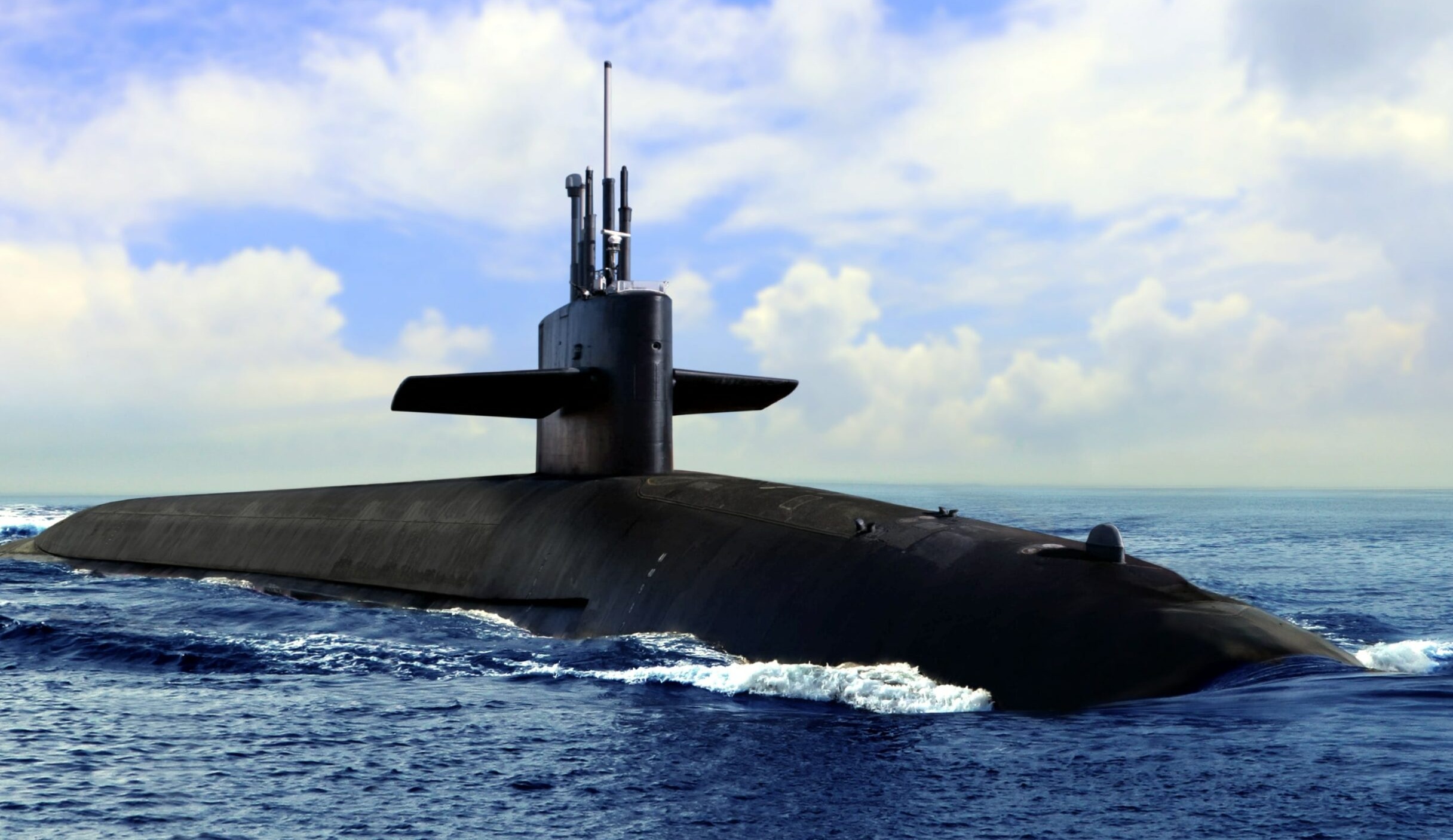 September 13, 2023
September 13, 2023Currently, due to the growing tensions, the nuclear factor has been playing an increasingly important role on the international arena. The problems of nuclear disarmament and nonproliferation continue to be one of the main concerns for the international community. Traditionally, Russian and foreign experts pay more attention to the study of the nuclear doctrines of Russia and the United States - the states with the largest nuclear arsenals. In this regard, the nuclear factor in the foreign policy of other countries, especially medium-sized states such as France, is often underestimated. Meanwhile, the issue of multilateral disarmament is a matter of the future and the effectiveness of the nonproliferation regime depends on how it will be resolved.
The goal of this research paper is to analyze the role of French nuclear weapons in the strategic culture of France at the present stage (1991-2023). August 21, 2023
August 21, 2023At the height of the Cold War, a retreat center located in Big Sur, California, made a difference in US-Soviet relations. The Esalen Institute emerged as a counterculture aiming to develop human potential through the early psychedelic movement, religion, spirituality, travels, and seminars. In many respects, the Esalen Institute has built a reputation among the cultured and privileged spheres of Western societies and used its know-how to forge links across the Iron Curtain.
This paper brings to the picture how some US-Soviet relations were initiated and maintained in times of crisis through Esalen Track 2 and Track 1.5 Diplomacy; it offers to explore the lessons learned and provide recommendations.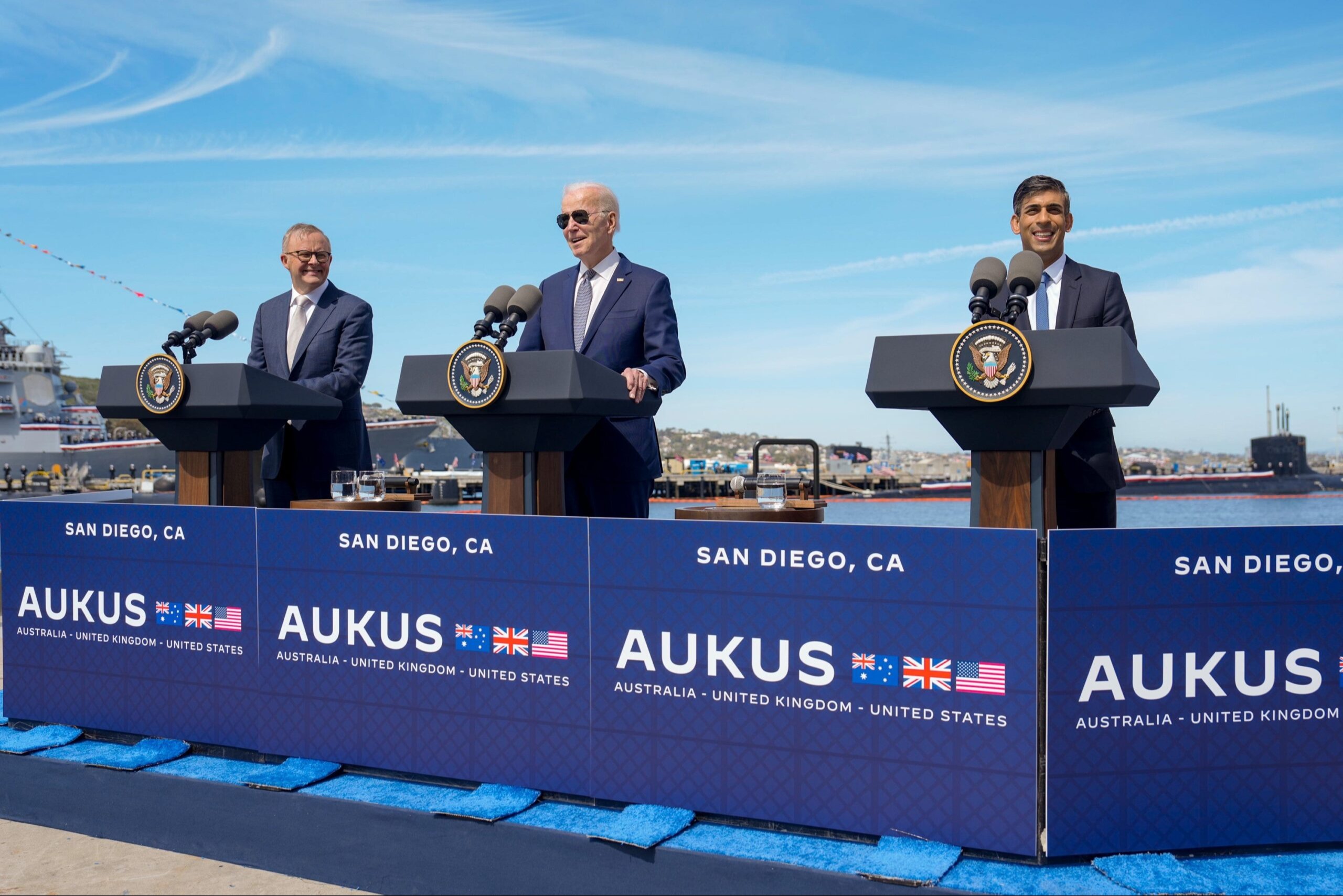 July 5, 2023
July 5, 2023This research paper takes a look at the recent AUKUS (Australia-UK-US) nuclear-powered submarines announcement and tries to put it in the context of Australia’s defence strategy.
It does so in three steps. First, it summarizes a promulgated optimal pathway to deliver nuclear-powered general-purpose attack submarine (SSN as the US Navy hull classification symbol) capability to the Royal Australian Navy. Secondly, it notes several thought-provoking reactions by Australian public figures and analysts. Thirdly, it discusses how AUKUS fits into Australia’s defence strategy and planning.
The paper concludes by examining the feasibility of Australia’s self-sufficient defence posture.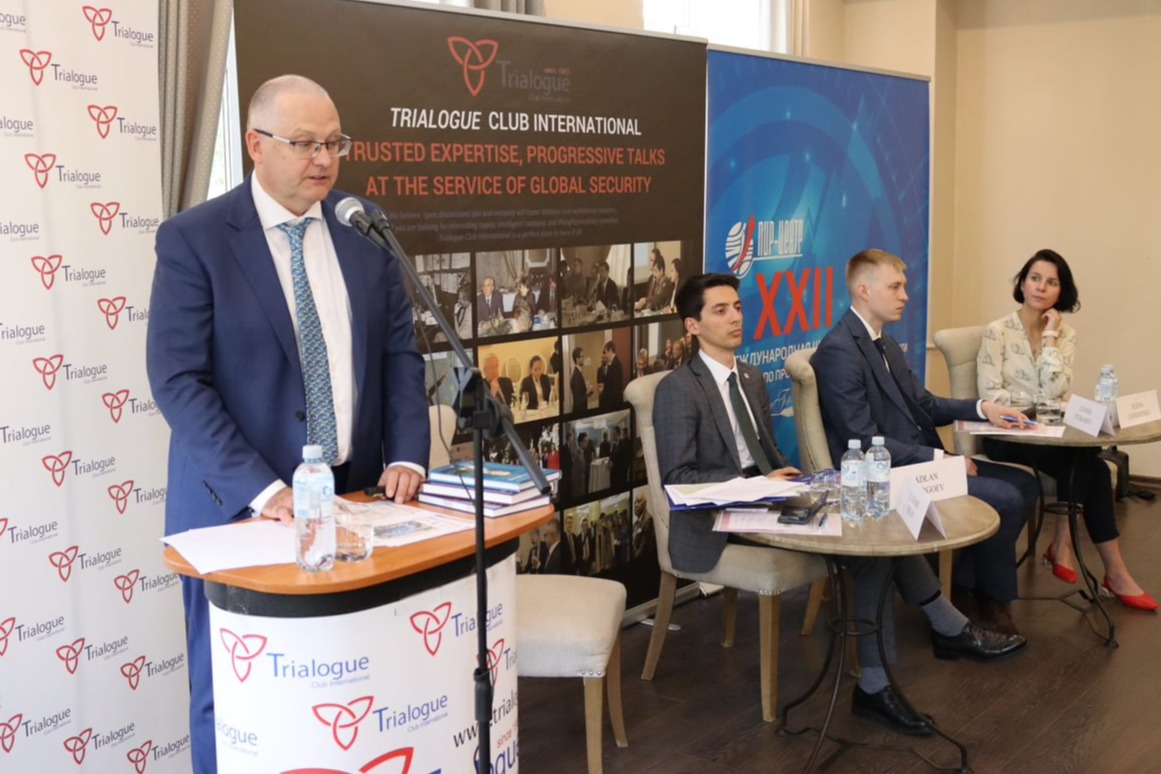 SECURITY ISSUES IN THE PERSIAN GULF REGION WERE DISCUSSED AT THE 118TH EXTENDED SUMMER SESSION OF THE TRIALOGUE CLUB INTERNATIONALJune 22, 2022
SECURITY ISSUES IN THE PERSIAN GULF REGION WERE DISCUSSED AT THE 118TH EXTENDED SUMMER SESSION OF THE TRIALOGUE CLUB INTERNATIONALJune 22, 2022On June 8, the 118th Extended Summer Session of the Trialogue Club International was held. It was devoted to the topic “Iran, Israel and the Gulf. A Changing Geopolitical Landscape. Assessing Emerging Trends”. This time the keynote speakers of the Session were Adlan Margoev, Research Fellow at the Center for Middle East and African Studies at MGIMO University, member of the PIR Alumni Community, and Leonid Tsukanov, PIR Center Web Site Chief Editor, expert of the Russian International Affairs Council.
After the main speeches, a traditional Q&A session took place, during which the participants were able to raise the most pressing issues of the agenda, clarify the details of interest to them, and also share their own comments. It should be noted that the issues brought up for discussion evoked a lively response from the audience, and some theses became the starting point for subsequent discussions.
The 118th Summer Session was moderated by Dr. Elena Chernenko, co-chair of the Trialogue Club International, Special correspondent of the Kommersant Daily.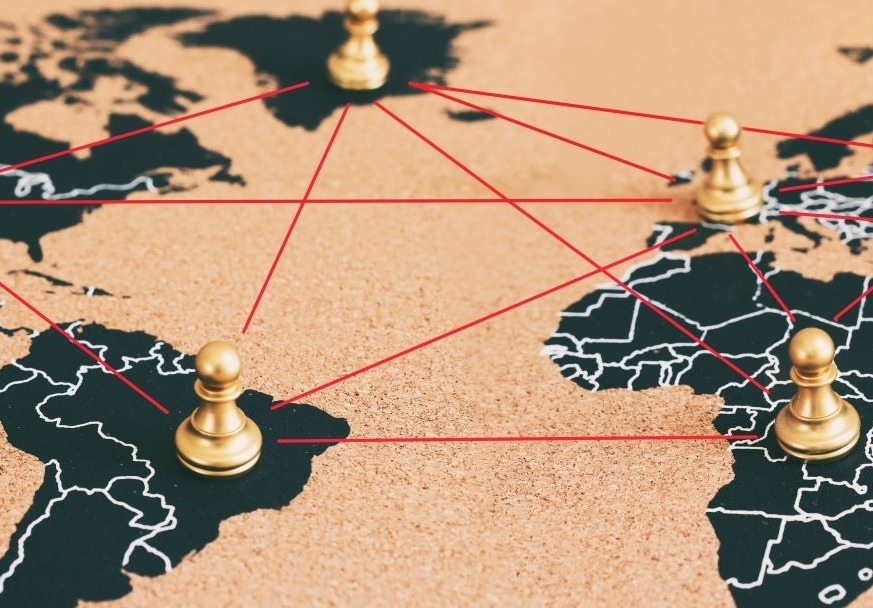 May 22, 2023
May 22, 2023Where is the world going? What does it mean the crisis of US-centered world order? How are the nuclear nonproliferation regime and American hegemony interconnected? What is the phenomenon of nuclear multipolarity? Is it worth escalating the fear of nuclear weapons and will nuclear testing resumption help this? Are we moving towards the use of nuclear weapons on the battlefield? What role can the crisis in Ukraine play?
This research paper was prepared in the format of an interview with Dmitry Trenin, a major Russian specialist in international relations, political scientist and expert, by Elena Karnaukhova, Deputy Director of PIR Center. Together with him, we managed to discuss the establishment of Pax Americana, the transformation of the modern world order, the role and specifics of the functioning of the UN, the current Ukrainian crisis, the risks and factors of the erosion of the nuclear nonproliferation regime, the fear of nuclear weapons, nuclear taboo, the concept escalate to de-escalate and much more – all the most important, relevant, burning issues at the forefront of the global security agenda.
About all of these openly and frankly – on the pages of this paper.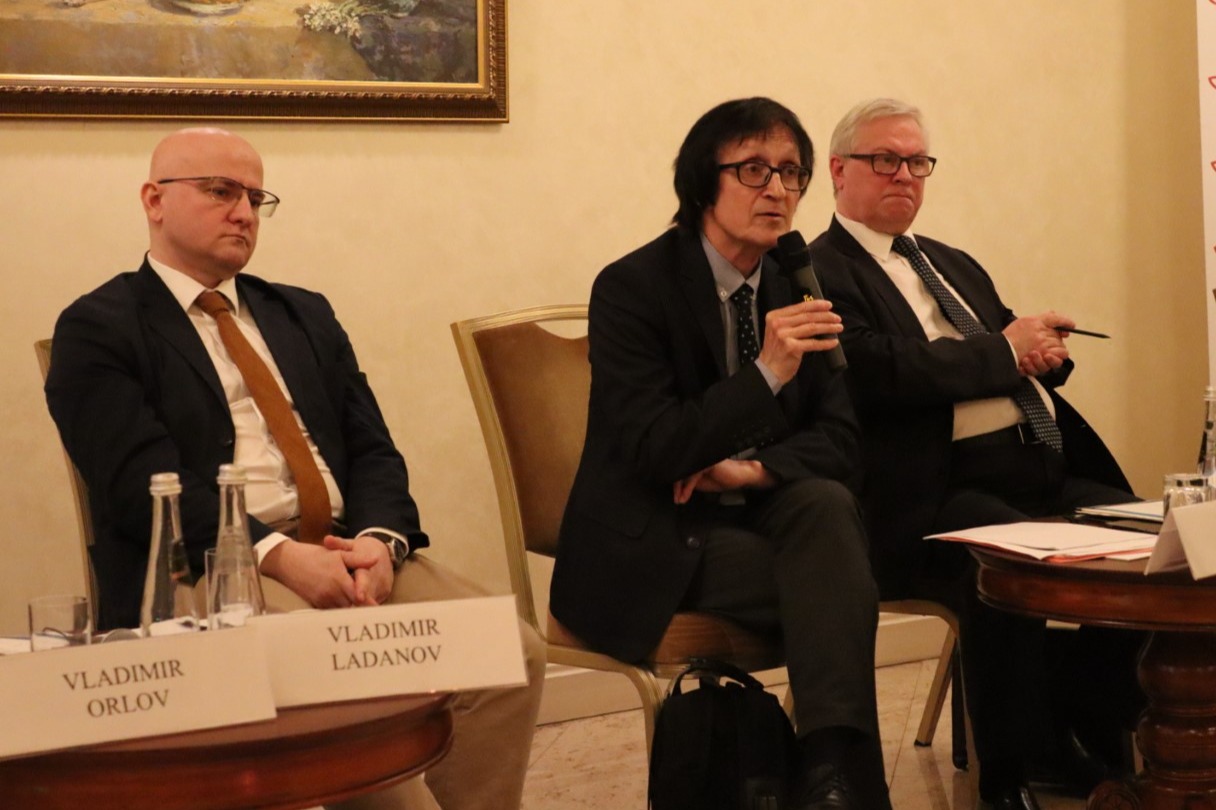 AUKUS ALLIANCE AND THE RISKS OF ARMED CONFLICT IN THE ASIA-PACIFIC REGION WERE DISCUSSED AT THE 117TH SPRING SESSION OF THE TRIALOGUE CLUB INTERNATIONALApril 6, 2023
AUKUS ALLIANCE AND THE RISKS OF ARMED CONFLICT IN THE ASIA-PACIFIC REGION WERE DISCUSSED AT THE 117TH SPRING SESSION OF THE TRIALOGUE CLUB INTERNATIONALApril 6, 2023On April 6, 2023, 117th Spring Session of the Trialogue Club International took place in Moscow. The agenda of this session this time was formulated as «Thucydides' Trap: AUKUS and the Risks of Military Conflict in the Asia-Pacific Region». Founding President of the Trialogue Club International and Founding Director of PIR Center Dr. Vladimir Orlov delivered welcoming remarks.
The Session was held in the panel discussion format. The keynote speaker was Vladimir Ladanov Head of the South Pacific States Section, Third Asia Department, Russian Foreign Ministry. Also, expert remarks were made by Viktor Sumskiy, Chief Research Fellow, Center for Asia Pacific Studies, IMEMO RAS, PIR Center Advisory Board Member and Mikhail Lysenko, Deputy Director, International Law Department, School of Government and International Affairs, MGIMO University, PIR Center Advisory Board Member.
After the main speeches, a traditional Q&A session took place, during which the participants were able to raise the most pressing issues of the agenda, clarify the details, and also share their own comments.
The 117th Spring Session was moderated by the co-chairs of the Trialogue Club International Elena Chernenko and Gen. Evgeny Buzhinsky.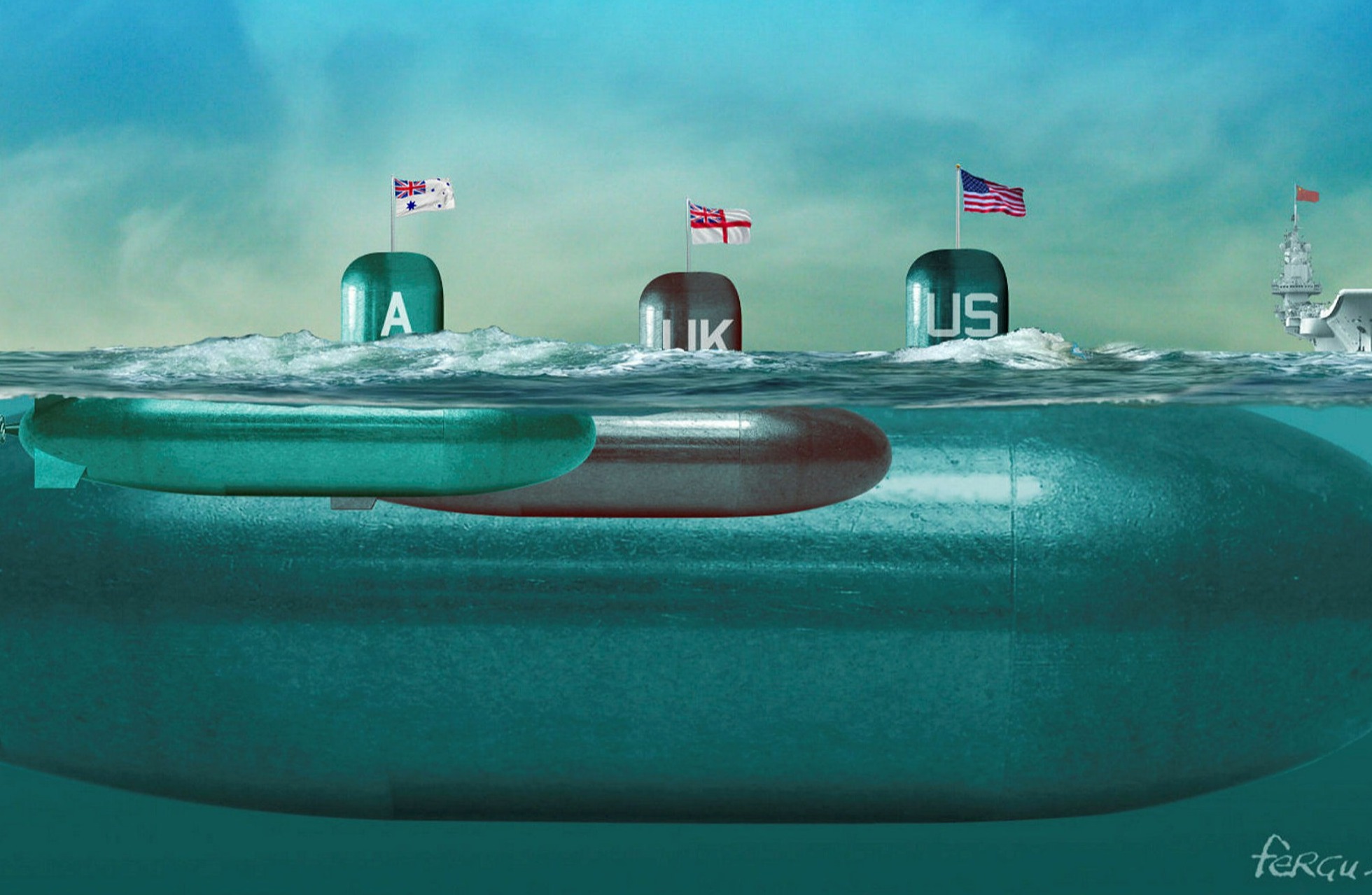 THE 117TH SPRING SESSION OF THE TRIALOGUE CLUB INTERNATIONALMarch 24, 2023
THE 117TH SPRING SESSION OF THE TRIALOGUE CLUB INTERNATIONALMarch 24, 2023On April 6, 2023, 117th Spring Session of the Trialogue Club International will be held on the topic “Thucydides' Trap: AUKUS and the Risks of Military Conflict in the Asia-Pacific Region”.
The Session will be held in the format of panel discussion. This time our keynote speaker is Vladimir Ladanov, Head of the South Pacific States Section, Third Asia Department, Russian Foreign Ministry. Expert comments on AUKUS and the security situation in the region will be also provided by Viktor Sumskiy, Chief Research Fellow, Center for Asia Pacific Studies, IMEMO RAS, PIR Center Advisory Board Member; and Mikhail Lysenko, Deputy Director, International Law Department, School of Government and International Affairs, MGIMO University, PIR Center Advisory Board Member.
The Session will start with the opening remarks of Vladimir Orlov, Founding President of the Trialogue Club International and PIR Center Founding Director. Then it will be co-moderated by the Club Co-Chairs Gen. Evgeny Buzhinskiy, Chairman of PIR Center Executive Board, and Elena Chernenko, Special Correspondent of the Kommersant Daily, Member of PIR Center Executive Board.
(by invitation only)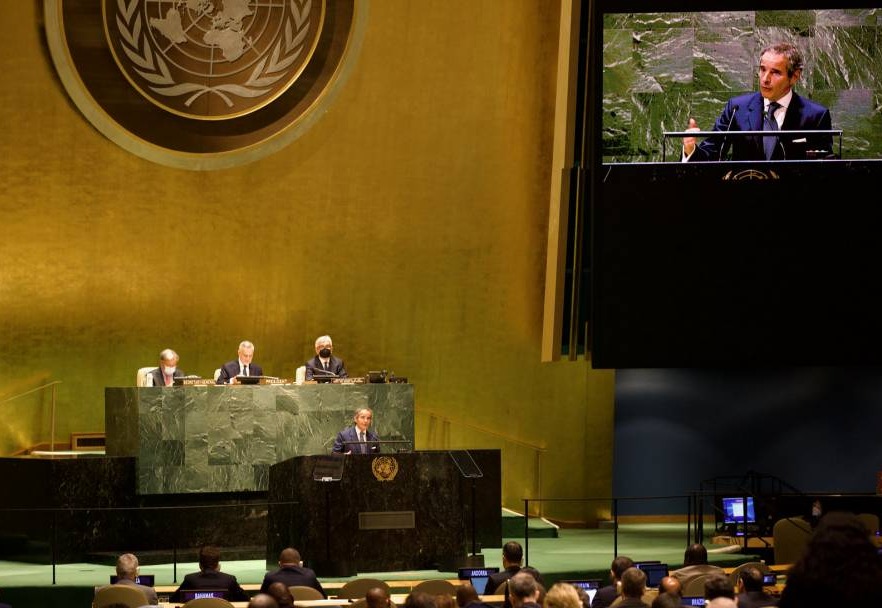 THE SECURITY INDEX OCCASIONAL PAPER SERIES CAME OUT WITH THE NEW REPORT "THE TENTH NPT REVIEW CONFERENCE (2022): CHRONICLE OF THE FAILURE FORETOLD" №1 (35)February 7, 2023
THE SECURITY INDEX OCCASIONAL PAPER SERIES CAME OUT WITH THE NEW REPORT "THE TENTH NPT REVIEW CONFERENCE (2022): CHRONICLE OF THE FAILURE FORETOLD" №1 (35)February 7, 2023In 2022, the NPT Review Conference was held in harsh geopolitical conditions, against the backdrop of an acute aggravation of the international situation. But was it ever any different? This research paper is a collection of all the materials prepared by PIR Center delegation as part of its participation in the Tenth NPT RevCon: informationand analytical notes (section I) and a series of interviews (section II).
By publishing it, we want to contribute to the discussion on the progress and outcomes of the Tenth NPT RevCon in order to prevent a systemic crisis in the review process of the Treaty on the Non-Proliferation of Nuclear Weapons (NPT), a cornerstone treaty in the field of international security.
Read the full report here.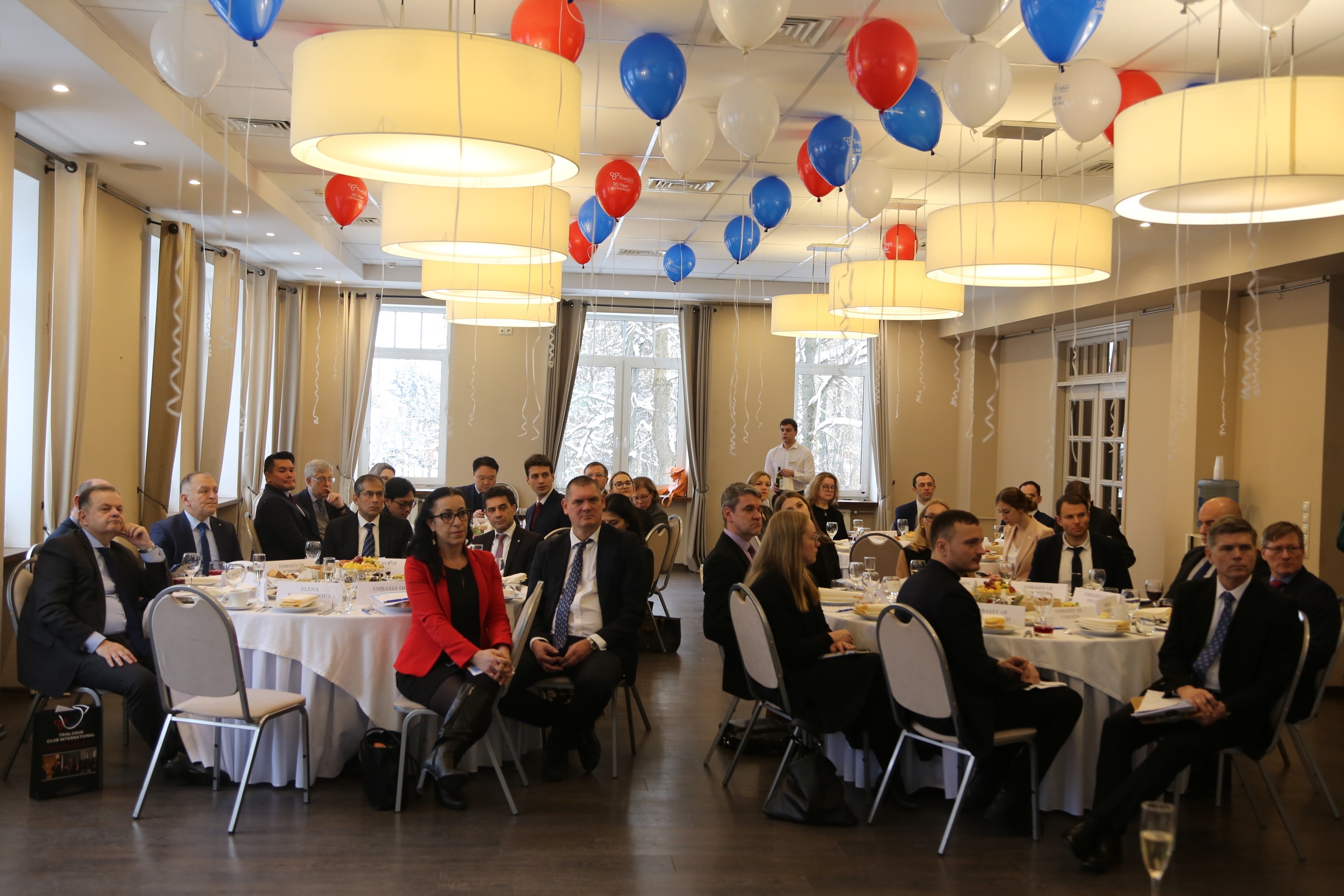 RUSSIAN FOREIGN POLICY PROSPECTS FOR 2023 WERE DISCUSSED AT THE 116TH WINTER ANNIVERSARY SESSION OF THE TRIALOGUE CLUB INTERNATIONALDecember 15, 2022
RUSSIAN FOREIGN POLICY PROSPECTS FOR 2023 WERE DISCUSSED AT THE 116TH WINTER ANNIVERSARY SESSION OF THE TRIALOGUE CLUB INTERNATIONALDecember 15, 2022On December 16, 2022, the 116th Winter Anniversary Session of the Trialogue Club International took place in Zvenigorod. The event`s agenda was devoted to the question “Russian foreign policy in 2023: what’s next?”. Within the Session we celebrated the 30th anniversary of the Club, which since 1993 has been following its key mission – to promote international dialogue on global security issues. The 116th Winter Anniversary Session of the Trialogue Club International was held in the panel discussion format. PIR Center Executive Board Member, Lead Researcher of the Center for International Security of IMEMO RAS Dr. Dmitri Trenin; Director General of the Russian International Affairs Council, PIR Center Advisory Board Member Dr. Andrey Kortunov; Dean of the School of International Relations of MGIMO University; Program Director of the Valdai Discussion Club Dr. Andrey Sushentsov; Founding President of the Trialogue Club International, Founding Director of PIR Center Dr. Vladimir Orlov; Director of the Crisis & Situation Awareness Centre (Department) of the Ministry of Foreign Affairs of the Russian Federation Mr. Yury Gorlatch took part in the Session as panelists.
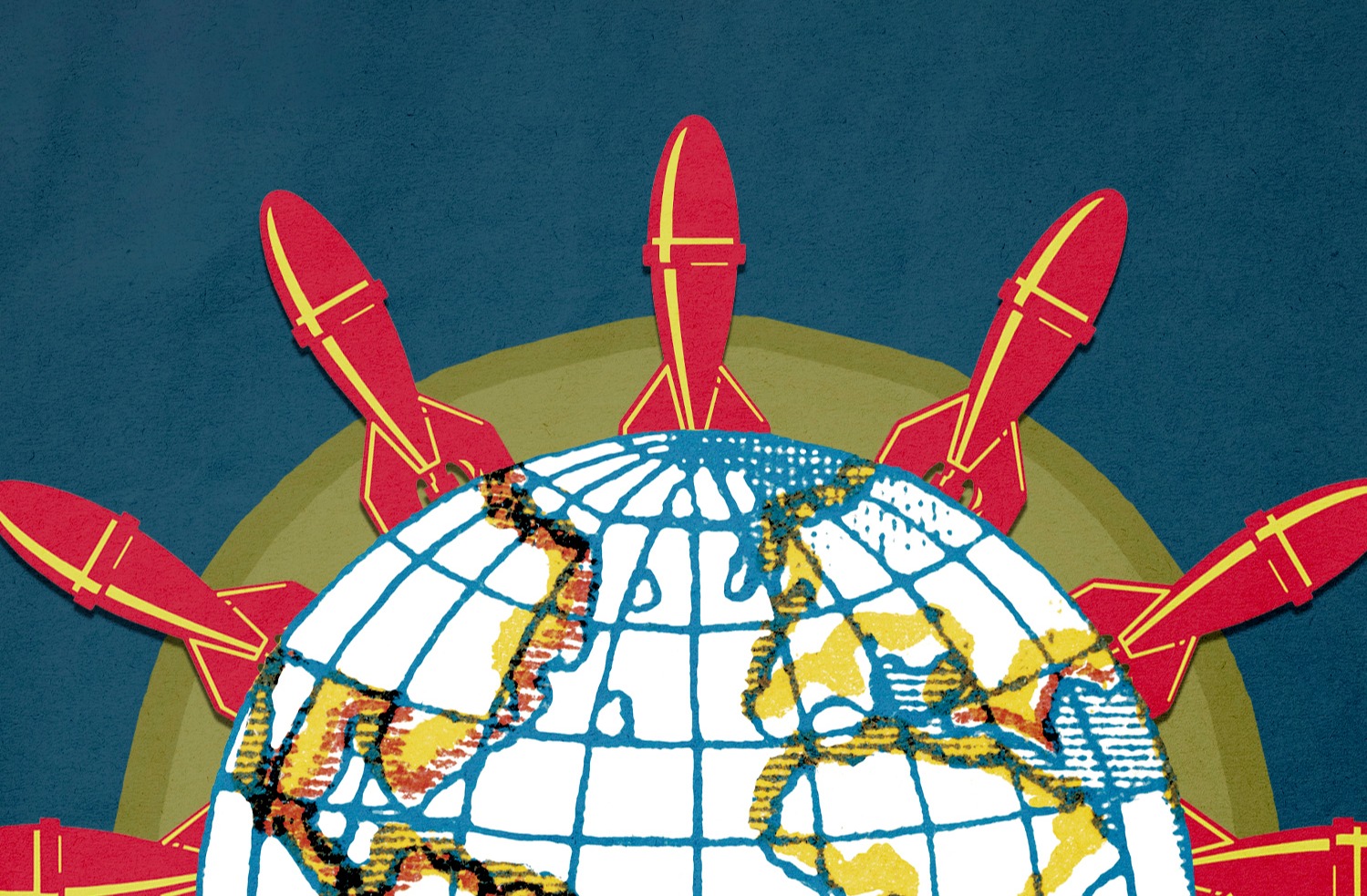 NEW NUCLEAR NINE? ASSESSING NUCLEAR PROLIFERATION THREATS IN THE WORLDDecember 13, 2022
NEW NUCLEAR NINE? ASSESSING NUCLEAR PROLIFERATION THREATS IN THE WORLDDecember 13, 2022PIR Center published a report “New Nuclear Nine? Assessing Nuclear Proliferation Threats in the World,” which analyzes possible threats to the nuclear nonproliferation regime in the long term.
This report was prepared by an author’s team of 12 researchers under the editorship of Vladimir Orlov, founder and director of PIR Center, and Sergey Semenov, Research Fellow of PIR Center. The authors consider the possible impact of further degradation of the international security situation on the prospects for the proliferation of nuclear weapons (NW) on the examples of Japan, South Korea, Taiwan, Ukraine, Turkey, Iran, Egypt, Saudi Arabia and Brazil.
Vladimir Orlov’s full introduction in English can be found here.
Table of contents in English can be found here.
secretary@trialogue-club.ru
+ 7 916 170 03 07